To live without faith, without a patrimony to defend, without a steady struggle for truth – that is not living, but existing.
Distinction Matter - Subscribed Feeds
-
Site: RT - News
Financing Ukraine does not serve America’s national security interests, Marjorie Taylor Greene says
The US is instigating a global conflict that could result in World War III by sponsoring Ukraine and waging a proxy war against Russia, Republican congresswoman Marjorie Taylor Greene has warned.
In an interview with journalist Tucker Carlson on Thursday, Greene, who represents Georgia, said “funding a foreign war” is not in the interests of US national security. Washington has provided Ukraine with $113 billion in various forms of assistance since the start of hostilities in 2022.
“Fighting a proxy war with Russia in Ukraine, which is a non-NATO member nation, is not protecting America’s national security interests, it doesn’t protect the United States of America, as a matter of fact, it pushes us closer and closer to world war three,” the politician stressed.
She went on to say that while Kiev is clamoring for the US to speed up the approval of the $60 billion aid package that remains stalled in Congress, American citizens are “losing” their country to the “illegal invasion that’s happening on our Southern border every single day.”
Greene was referring to the illegal immigration crisis at the Mexican border. US President Joe Biden’s handling of the border security issues has drawn increased criticism in recent months. Upon taking office in January 2021, Biden halted the border security initiatives of his predecessor, Donald Trump. Since then, the US has seen a record influx of illegal migrants and suspected terrorists, as well as increases in drug trafficking.
“We are angry and people have had it. We don’t want $60 billion to go to Ukraine because as we slept last night we just went $40 billion more into debt and that’s because the interest on our debt is so huge and our debt is so massive,” Greene claimed.
Read more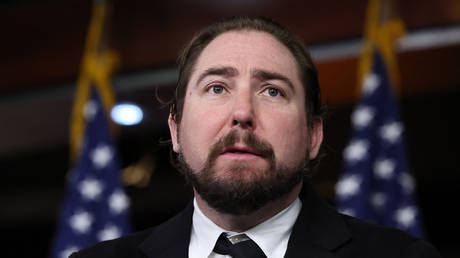 Ukraine aid will bankrupt future US generations – congressman
Ukraine aid will bankrupt future US generations – congressman
The US national debt topped $34 trillion in December and the Congressional Budget Office (CBO) projected in February that more than $12 trillion would be spent on interest costs alone over the next ten years.
On Wednesday, Greene warned House Speaker Mike Johnson that moving ahead with the aid package for Kiev would be one of “the most egregious things he could do.”
The second-term congresswoman added that US intelligence operatives are directing the Ukraine conflict on the ground. She argued that Johnson’s support for such policies belies the Republican leader’s claims of Christian faith.
“Every single day to fund a war, to pay for it, to continue it, to advise it... to have our CIA on the ground over there running that war in Ukraine against Russia, nuclear-armed Russia... that is a complete departure from anything that is Christian,” Greene said.
Meanwhile, Russia has repeatedly condemned Western arms shipments to Ukraine, saying that arming Kiev only prolongs the conflict while making the West a direct participant in the hostilities.
-
Site: RT - News
With Kiev fighting Moscow, the bloc has saved its own troops, Jens Stoltenberg has said
Western military support for Ukraine has allowed the bloc to weaken Russia without sending its own soldiers to die on the battlefield, NATO Secretary-General Jens Stoltenberg has said.
Speaking at a summit of NATO foreign ministers in Brussels on Wednesday, the head of the US-led military bloc reiterated calls to provide Kiev with more ammunition and weapons in the long term, arguing that this suits Western interests.
“Support from NATO allies and support from the United States to Ukraine is something which benefits our own security interests,” Stoltenberg said.
He noted that “by allocating a fraction of our defense budgets, we have enabled the Ukrainians to destroy significant parts of the Russian combat capability” – and this has been done “without putting any NATO soldier, any US soldier, in harm’s way.”
Read more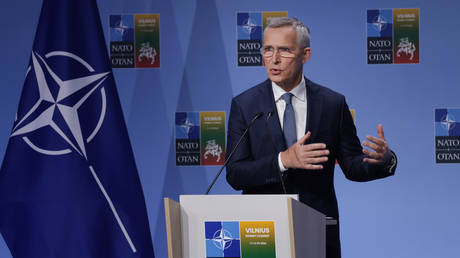 ‘Eye-rolls’ in NATO as Stoltenberg pushes for Ukraine long-term support – Politico
‘Eye-rolls’ in NATO as Stoltenberg pushes for Ukraine long-term support – Politico
The secretary-general argued that the West should step up its efforts in this regard, including by making its campaign to support Ukraine more sustainable in the long run.
Several Western media outlets reported earlier this week that Stoltenberg is championing a five-year €100 billion ($107 billion) aid package for Kiev, which would see NATO take on more responsibility from the US in terms of coordinating the assistance.
However, Politico reported on Wednesday that some NATO members have voiced doubts about the plan, expressing uncertainty regarding the details and where this figure came from in the first place.
In late February, Russian Defense Minister Sergey Shoigu estimated Ukraine’s losses at more than 444,000 troops since the start of the conflict. Earlier this week, he said that Kiev had lost more than 80,000 soldiers since the start of 2024.
This comes as Ukrainian President Vladimir Zelensky signed a highly controversial law lowering the conscription age for men from 27 to 25 to replenish the battlefield losses.
President Vladimir Putin has said that NATO is using Ukrainians as “cannon fodder,” and is using the country as a “testing ground” against Russia, arguing that the West is willing to fight “to the last Ukrainian.”
-
Site: RT - News
Rishi Sunak has cited the importance of border security and controlling illegal migration as reasons to leave
British Prime Minister Rishi Sunak threatened on Wednesday to abandon the European Court of Human Rights (ECHR) if it tries to block the UK’s efforts to fight illegal migration by sending asylum-seekers to Rwanda for processing.
In an interview with The Sun, Sunak said border control and state security should take precedence over the UK’s 71-year adherence to the European Convention on Human Rights, which the court enforces.
“I believe that border security and controlling illegal migration is more important than our membership of any foreign court,” Sunak said, adding that it was “fundamental to our sovereignty as a country” and that he may make it an election pledge later this year.
The UK has been struggling against the flow of illegal migration for years with successive Conservative prime ministers pledging crackdowns to address the issue. The country’s exit from the EU in 2016 was partly attributed to a desire to regain control of the nation’s borders.
“I come from a family of immigrants – and I think this will always be a welcoming, compassionate country – but that has to be done fairly, it has to be done legally,” the prime minister said. “We are a people who wait their turn, pay their fair share, play by the rules, and this offends every one of those notions. That’s why it’s so important that we grip it.”
Read more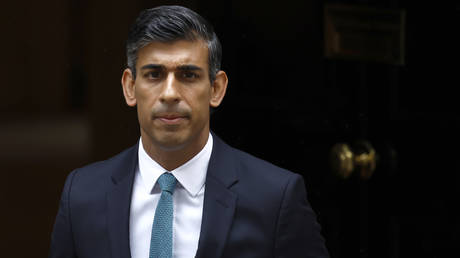 ‘A violation of human rights’: Will the UK government get away with deporting asylum seekers to Africa?
‘A violation of human rights’: Will the UK government get away with deporting asylum seekers to Africa?
In April 2022, London reached an agreement with Rwanda, located in Central Africa, for illegal migrants to be sent there, but in June of the same year the first flight was canceled by decision of the ECHR.
Later that year, Dominic Raab, then deputy prime minister, introduced legislation that would make the Supreme Court in London the final arbiter on human rights issues and allow the UK to ignore decisions by the ECHR. London and Kigali later extended the deal, applying it to those who entered the country by crossing the English Channel by boat, and cannot be sent back to their country of origin.
In February, however, UN High Commissioner for Human Rights Volker Turk warned that the British government’s draft legislation declaring Rwanda a safe country in which to resettle asylum seekers violates principles of the rule of law.
The UK is one of the founding members of the ECHR, becoming the first country to ratify the convention back in 1951.
-
Site: RT - News
Washington is aiming to prolong the Ukraine conflict instead of supporting a peaceful resolution, the former Democratic congresswoman has said
The administration of US President Joe Biden has actively thwarted peace efforts in the Ukraine conflict and is trying to prolong the fighting in a bid to damage Russia, former Hawaii Democratic Representative Tulsi Gabbard has said.
Speaking to Lex Fridman in a podcast published on Wednesday, the former congresswoman insisted that in “an ideal world,” the US president would sit down with the leaders of Ukraine and Russia to find a peaceful solution to the hostilities.
She doubted, however, that Biden is the “right person” for the job, suggesting that “all the statements and comments that the [White House] has made from the beginning of this war essentially point to their objective being to basically destroy Russia.”
Gabbard stated that peace in Ukraine should be mediated by the most “effective, neutral broker that there is.” If the current US administration wants to fulfill that role, it should start actively encouraging Ukrainian President Vladimir Zelensky to sit down and begin negotiations, she added.
In February, Gabbard publicly denounced her former party as enemies of democracy driven by an “insatiable hunger for power,” and officially endorsed Republican candidate Donald Trump for reelection this year.
Read more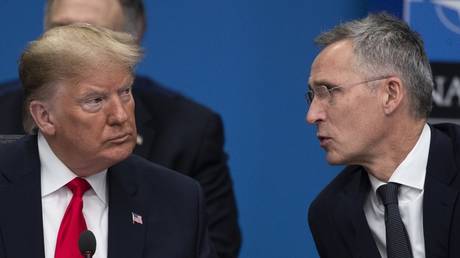 NATO seeking to insulate Kiev from Trump pressure – media
NATO seeking to insulate Kiev from Trump pressure – media
During his campaign, the former US president has claimed that the Ukraine conflict would never have broken out on his watch, insisting that if voted back in, he would end the fighting “in 24 hours.”
Kiev, meanwhile, has continued to reject any peace talks with Moscow, after Zelensky legally banned negotiations with Russian President Vladimir Putin’s government. Instead, the Ukrainian leadership has been rallying Western support for Zelensky’s ten-point “peace formula,” which demands the full withdrawal of Russian forces to Ukraine’s 1991 borders, including Crimea, as well as forcing Moscow to pay reparations and face an international tribunal.
Russia has stressed that it remains open to talks with Ukraine, but has demanded that Kiev accept the “reality on the ground.” President Vladimir Putin has insisted that Moscow is ready for “a serious conversation” and wishes to resolve the conflict through peaceful means. He has noted, however, that any talks must include security guarantees for Russia and cannot be used as a pause for Ukraine’s rearmament.
-
Site: RT - News
Several European countries are reportedly worried that an effort to extend aid for Kiev will give the bloc even more power
NATO chief Jens Stoltenberg’s idea to create a long-term €100 billion ($107 billion) plan to support Ukraine has sparked a lot of doubt within the organization, with many wondering where it came from in the first place, Politico reported on Wednesday.
The head of the US-led bloc previously urged NATO allies to “shift the dynamics of our support” for Ukraine which has repeatedly complained of the lack of Western-supplied ammunition and weapons while being hard-pressed by Russian troops.
To this end, the secretary-general proposed ensuring “reliable and predictable security assistance to Ukraine for the long haul” which he said must be based on NATO’s long-term commitments rather than voluntary donations.
This came after several Western media reported that Stoltenberg wanted to draw up a five-year €100 billion package of military aid to Kiev, which would also see NATO take on more responsibility for coordinating the assistance to Ukraine from the US. He has declined to go into specifics however, and has not confirmed the figure, suggesting that the details will be hashed out by this summer.
Read more Kiev’s backers fear frontline breach – media
Kiev’s backers fear frontline breach – media
Politico also reported that while top officials in countries such as Poland, Türkiye, and Germany have endorsed the initiative, some were much less enthusiastic. According to one of the outlet’s sources, some ministers from undisclosed countries “rolled their eyes” at the 100 billion number, unsure where it came from.
The article also says that several Western European nations fear that the plan would give NATO even more clout and undermine EU efforts to boost its own role in the defense sphere. It also remains unclear whether the sum would be attained through fresh contributions, or cobbled together from already existing programs.
Some Western diplomats also pointed out that debates over the plan are at an early stage, with some saying they would like to see the details first before supporting the initiative. However, Hungary turned out to be a notable exception, with Foreign Minister Peter Szijjarto insisting that Budapest will oppose any moves that could lead to escalation.
Russia has repeatedly condemned Western arms shipments to Ukraine, warning they will only prolong the conflict without changing its outcome. Russian Foreign Ministry spokeswoman Maria Zakharova has described NATO as “an aggressive bloc” using Ukraine as a tool to undermine Moscow.
-
Site: RT - News
NATO members who fail to meet the 2% defense spending threshold are playing “Russian roulette,” Grant Shapps has said
NATO members not spending 2% of their GDP on defense are playing “Russian roulette” with the West’s future, UK Defense Secretary Grant Shapps has claimed.
In an article for The Telegraph published on Wednesday, Shapps said members of the US-led bloc must accept the West is now in a “pre-war” world and therefore need to raise their military expenditure.
Many NATO states have for years struggled to reach an agreed threshold of 2% of GDP for defense spending, but the process gained momentum after the start of the Ukraine crisis in 2014 and especially after the launch of Russia’s military operation in 2022.
“We must look beyond that target to shore up our defenses. Yet some nations are still failing to meet even the 2%. That cannot continue. We can’t afford to play Russian roulette with our future,” Shapps wrote.
Only 11 of NATO’s 32 countries met the bloc’s guideline last year. France and Germany were among those which spent less on defense, according to an annual report, though Paris and Berlin recently pledged they will meet targets this year. NATO Secretary-General Jens Stoltenberg claimed in February that 18 members are on track this year to meet the 2% target.
Read more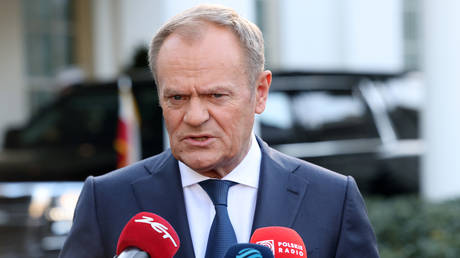 Europe is in ‘pre-war era’ – NATO country’s PM
Europe is in ‘pre-war era’ – NATO country’s PM
In an article marking NATO’s 75th anniversary, Shapps said the bloc’s members “must give urgent thought once again to the alliance’s future.”
“We have moved from a post-war to a pre-war world. Russia is menacing our neighbors. China is increasingly belligerent. Iran is using its proxies to cause regional havoc from the Middle East to the straits of Yemen. And North Korea is perpetually rattling its nuclear sabre,” the defense secretary claimed.
Polish Prime Minister Donald Tusk delivered a similar message last week, when he said Europe had entered a “pre-war era” in which “any scenario” is possible. Tusk insisted that “no one in Europe will be able to feel safe” if the West does not provide Kiev with sufficient equipment and ammunition for the conflict with Russia.
Echoing those remarks, UK Foreign Secretary David Cameron said on Wednesday that the West needs to “win the argument for NATO all over again with a new generation,” claiming that Europe faces the same situation as in 1938.
Numerous Western leaders have warned in recent weeks that Russia could attack NATO within a few years. Russian President Vladimir Putin has dismissed those claims as “utter nonsense” designed to “beat the money out” of the populations of Western countries.
-
Site: RT - News
Venezuelan President Nicolas Maduro sees Washington’s actions close to his country’s borders as “aggression”
The United States has installed “secret military bases” in the disputed region of Essequibo, Venezuelan President Nicolas Maduro claimed on Thursday.
The Latin American leader was speaking at a ceremony commemorating a recent law defending Guyana Essequibo. The 62,000-square-mile oil- and mineral-rich area around the Essequibo River is at the center of a territorial dispute between Venezuela and Guyana, a former British colony.
“We have information proving that, in the territory of Guyana Essequibo, temporarily administered by Guyana, secret military bases of the [US] Southern Command... a body of the CIA, have been installed,” Maduro said.
The bases constitute “aggression” against the people of southern and eastern Venezuela, and were built “to prepare for an escalation against Venezuela,” he added.
The US Southern Command, part of the Department of Defense, maintains a Security Cooperation Office in Guyana, and serves as a military consultant to the Guyana Defense Force, providing military support and training.
Following a national referendum at the beginning of December, Caracas laid claim to Guayana Esequiba – a mostly forested region that Venezuela claims to have owned for over a century. Guyana has protested, noting that the area amounts to two-thirds of its internationally recognized territory, and has asked the international community for help.
Read more Venezuelan leader orders response to British warship
Venezuelan leader orders response to British warship
The dispute over the Essequibo area intensified in 2015 after US-based energy giant ExxonMobil discovered oil deposits there. After December’s referendum, US forces held joint US-Guyana military exercises. The British Royal Navy deployed patrol ship HMS Trent to Guyana in January to show its backing for the country.
According to Maduro, the disputed region is being controlled by the Southern Command, the CIA, and ExxonMobil, which are seeking to seize Venezuelan resources.
-
Site: Padre PeregrinoThe men of that [last] generation will have no deeds whatever, but there will come upon them temptation, and those who are worthy in this temptation will be higher than us and our fathers.—St. Ischyrion of Egypt. I have wondered for a long time if good Catholics in any given period in history have to [...]
-
Site: RT - News
Washington and London are claiming Beijing sponsored a cybercrime campaign against them three years ago. Why did they wait until now?
In March, the UK, in conjunction with the US and other members of the Five Eyes intelligence alliance, accused China of engaging in a state-sponsored hacking campaign against them. In response to the alleged 'attack' they launched coordinated sanctions against a small group of hackers and their associated businesses.
The sanctions were particularly big news in Britain, where the government suddenly decided that Beijing had been behind a hack on the electoral commission three years ago. Notably, the country’s Conservative party-aligned newspapers all pushed this narrative in an aggressive fashion.
These accusations by the Five Eyes nations are not so much genuine concerns as they are a deliberate and opportunistic act of political theatre which, largely driven by the US, seeks to slander China for diplomatic and political gain. The sanctions, although narrow in scope and thus meaningless, are designed to try and send a message to and about China. It is essentially a fearmongering campaign, which seeks to both undermine Beijing’s engagement with other countries and serve domestic political purposes in the US.
The rhythm of US escalation and de-escalation with China
The US has an adept foreign policy whereby it intentionally chooses to escalate and de-escalate tensions with China at opportune moments, which is precisely why calls for “engagement” with Beijing coming from Washington D.C. cannot be trusted. The US does not change its goals or its policies, only its tactics in consideration of what suits it at that particular moment. Hence it has always alternated between overtures and deliberate provocations. It usually does so by having a certain report or development leaked to the media at an opportunistic time, in order to craft a particular narrative which mandates a certain set of reactions and policy responses.
Read more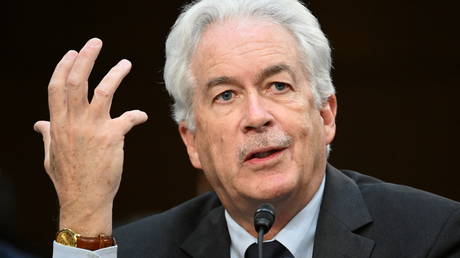 How America’s top spymaster sees the world and why it’s so disappointing
How America’s top spymaster sees the world and why it’s so disappointing
To give some examples of such, the Trump administration played down tensions with China directly in 2019, even amidst the Hong Kong crisis, in order to secure a “trade deal” with Beijing. Once it got what it wanted by 2020, and the Covid-19 pandemic struck, it deliberately unleashed a full-on crusade against Beijing on every front. Similarly, the Biden administration came into office and then immediately upped tensions with China on the Xinjiang issue in order to damage China’s ties with Europe in a build-up to coordinated sanctions as a display of transatlantic unity.
After this was done, it then decided it wanted to “cool” things down for a bit and establish “guardrails” so the rhetoric guns went silent for a few months as Washington reached out to Beijing. Then, as the 2022 Beijing Winter Olympics came, it took the “Xinjiang card” off the shelf again with a number of timed leaks and publications geared towards supporting a Winter Olympics boycott, as well as a sweeping ban on all Xinjiang goods under the premise of “forced labour” at that time.
What we see is that the US does not truly de-escalate with China, it “blows hot and cold” and essentially manipulates the media cycle to pursue its policy preferences as it sees fit. This means that major issues pertaining to China only tend to appear when there is an agenda serving it.
The newest phase
Now, the Biden administration has made a political design to escalate tensions with China by accusing it, in coordination with the Five Eyes, of state-backed hacking and cybercrime. The fact that the British government would sit on such an accusation for three years suggests both clear political purpose and timing. The question is, why? First, we are approaching a Presidential election in the US. It was always an inevitability that the administration would want to appear “tough” on China to prevent the issue from being used as an attack point by Biden’s rival, Donald Trump. As seen in 2020, an election year tends to become a year of very aggressive rhetoric and extreme theatrics.
Secondly, there is the goal of undermining China’s engagement with Europe. It has been publicly announced that Xi Jinping will visit a number of European countries in May, including France. As stated above, the US, with the support of the Five Eyes countries, actively seeks to damage Chinese diplomacy with Europe by weaponizing negative publicity in order to narrow political space for engagement.
What we see from this is that the US engages China on its own terms, but seeks to prevent those it deems as “allies” from doing the same, and thus resorts to psychological warfare through the manipulation of mass media.
In conclusion, when one sees these strategies being utilised, one recognises that the Western media has far less independence and impartiality than it claims to have, but is indirectly subject to the preferences of US policy. W
hen the White House says “jump”, reporters ask, “how high?” and thus we see that a new propaganda campaign has been cultivated against Beijing, but of course, we should not be blind to the reality that there is no greater weaponisation of cyberspace and espionage in the world than the system created by the Five Eyes. And are we really going to pretend the CIA doesn’t hack anyone?
-
Site: RT - News
The Palestinian Authority has relaunched its bid to join the UN after a failed attempt in 2011
The Palestinian Authority (PA) has formally requested that it be admitted as a full-fledged member of the United Nations. The State of Palestine has held observer status at the UN since 2012, but full membership would amount to a recognition of Palestinian statehood, which Israel opposes.
“Today, the State of Palestine, and upon instructions of the Palestinian leadership, sent a letter to the Secretary General requesting renewed consideration to [our] membership application,” the Palestinian Authority’s permanent envoy to the UN, Riyad Mansour, wrote in a post on X on Tuesday.
In a separate letter to UN Secretary General Antonio Guterres, the Arab Group, Organization for Islamic Cooperation, and Non-Aligned Movement all backed Mansour’s request.
Under the governance of the PA, the State of Palestine claims sovereignty over territory considered Palestinian before the outbreak of the 1967 Six-Day War. This includes Gaza, the entire West Bank, and East Jerusalem. Israeli Prime Minister Benjamin Netanyahu has repeatedly rejected the idea of Palestinian statehood, and vowed to impose “full Israeli security control over the entire area west of Jordan,” which includes all of these regions.
Read more Planned Israeli attack threatens entire Arab world – Arab League
Planned Israeli attack threatens entire Arab world – Arab League
Parts of the West Bank are already under full Israeli military and civilian control, while Gaza is governed by Hamas, which views the PA as illegitimate for recognizing and negotiating with Israel.
Applications for UN membership must be approved by the secretary general before being presented to the 15-member UN Security Council for a vote. The PA applied for membership in 2011, but the application was never put to the Security Council. At the time, the US – as one of the council’s five permanent members – said it would exercise its veto power in the event of a successful vote.
The following year, the UN upgraded the State of Palestine’s status from “non-member observer entity” to “non-member observer state,” a status held only by it and the Vatican City.
While the PA’s renewed application would again be at risk of veto from the US, Washington has signaled that it is willing to break from its usual policy of vetoing any security council decision that goes against Israeli interests. Late last month, the US abstained from voting and allowed the council to adopt a resolution demanding an immediate ceasefire in Gaza.
READ MORE: UK facing growing pressure over arms sales to Israel
Despite the US’ continued military support for Israel, the abstention was seen as a sign of a widening rift between Netanyahu and US President Joe Biden.
Some 140 UN member states have already recognized the State of Palestine.
-
Site: RT - News
The killing of foreign aid workers in Gaza has reignited calls for a halt to supply of British weaponry
The UK is facing renewed calls to stop exporting arms to Israel, following the deadly bombing by the country’s military of a humanitarian convoy in Gaza, media outlets are reporting.
On Monday, seven World Central Kitchen (WCK) aid workers, mostly foreigners and including three British nationals, were killed by Israeli airstrikes that were purportedly targeting a Hamas militant. The incident has sparked international condemnation.
Peter Ricketts, former national security adviser to then-Prime Minister, now-Foreign Secretary David Cameron, stated on Wednesday in comments on the incident that Britain had now “reached that point.” He urged the UK to send a “signal” to Israel that it has not been taking its obligations under international law seriously enough.
“Sometimes in conflict you get a moment where there is such global outrage that it crystallizes a sense that things can’t go on like this. I hope that this awful incident will serve that purpose,” Ricketts told the BBC.
Britain’s main opposition parties demanded on Wednesday that the Conservative government publish legal advice it has received on whether Israel has broken international humanitarian law during the war in Gaza.
David Lammy, foreign affairs spokesman for the opposition Labour Party, said “there are very serious accusations that Israel has breached international law.”
He called on the government to “publish the legal advice now,” claiming that “if it says there is a clear risk that UK arms might be used in a serious breach of international humanitarian law, it’s time to suspend the sale of those arms.”
Read more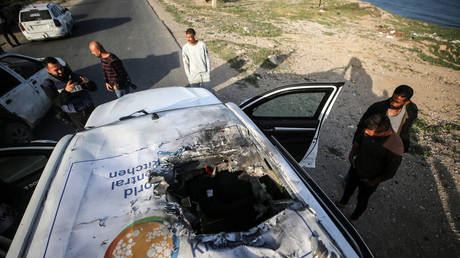 Israel apologizes for aid convoy deaths
Israel apologizes for aid convoy deaths
British Prime Minister Rishi Sunak did not commit to publishing the legal advice, but said that London followed a strict “set of rules, regulations and procedures” over licensing arms exports.
UK ministers say defense sales to Israel were worth about £42 million ($53 million) in 2022. According to the Campaign Against Arms Trade, a group lobbying for an end to sales of weapons, the UK has approved at least £474 million ($560 million) in exports to Israel since 2015.
Those exports reportedly include parts for missiles, tanks and combat aircraft, including tires, ejector seats, fan propellers and laser targeting equipment for jets being used in Gaza.
Britain is also involved in making parts for American-made F-35 fighter jets that are used by the Israeli air force, according to arms-control expert Roy Isbister of campaign group Saferworld.
“The UK produces 15% of every F-35, and so if the UK says ‘no’ to exports, that does become significant, and an issue for Israeli capabilities which would risk upsetting the Americans,” Isbister told The National.
-
Site: RT - News
The organization reportedly warned that an invasion of Rafah would destroy any chance of a peaceful resolution to the Israel-Hamas war
An Israeli attack on the Palestinian city of Rafah, located in Gaza on the Egyptian border, would be considered an attack on pan-Arab national security, the Council of the Arab League has announced, according to reports. Israeli Prime Minister Benjamin Netanyahu has repeatedly vowed to invade the refugee-packed city despite international condemnation.
The decision came during an extraordinary meeting of the 22-nation council in Cairo on Wednesday, Al Arabiya reported. The council also declared that “invading Rafah will lead to the collapse of chances for peace and the expansion of the conflict,” the Saudi broadcaster paraphrased.
The meeting was called by Palestine to address Israel’s “genocide and policies of starvation and displacement,” as well as its refusal to abide by a UN Security Council resolution demanding that it halt military operations in Gaza during the month of Ramadan.
Israeli Prime Minister Benjamin Netanyahu announced on Sunday that he had approved an “operational plan” to invade Rafah, claiming that “there is no victory without entering Rafah and there is no victory without eliminating the Hamas battalions there.”
Read more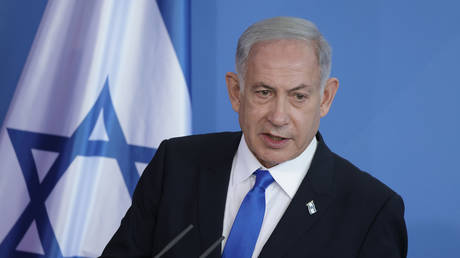 Netanyahu approves ‘operational plan’ to attack Rafah in Gaza
Netanyahu approves ‘operational plan’ to attack Rafah in Gaza
Netanyahu has promised since February to send troops into Rafah, a densely-packed city located in southern Gaza. With much of the rest of the enclave destroyed by Israeli bombing raids and ground maneuvers, Rafah is currently home to an estimated 1.5 million displaced people, more than half of the pre-conflict population of the enclave.
As such, Netanyahu has been heavily criticized for his planned invasion. The UN has warned that an assault on Rafah “could lead to a slaughter” of civilians, while the US has refused to back the operation without seeing an Israeli plan to move civilians out of harm’s way. As of Monday, American officials were still waiting to see such a plan, CNN reported.
Last month, US President Joe Biden warned Netanyahu that Israel would be crossing a “red line” if it invaded Rafah. Netanyahu dismissed Biden’s warning, telling German media “I have a red line. You know what the red line is? That October 7 doesn’t happen again.”
READ MORE: US secretly sending more bombs to Israel – WaPo
Hamas fighters attacked Israel on October 7, killing around 1,100 people and taking roughly 250 hostages back to Gaza. Israel responded by imposing a near-total siege on Gaza and launching air raids on the enclave, followed by a ground invasion. Nearly 33,000 people have been killed in Gaza in the months since, most of them women and children, according to the enclave’s health ministry.
The Arab League has repeatedly condemned Israel’s war, and called for the establishment of an independent Palestinian state. The organization has also rejected Israeli proposals to move the entire population of Gaza into Egypt or the West, with Secretary General Ahmed Aboul Gheit calling these plans “insane.”
-
Site: RT - News
The EU and the US consider Serbia an easy target
Modern international politics, as practiced by Western countries, sometimes take on a completely absurd character. Recently, the Political Committee of the Parliamentary Assembly of the Council of Europe (PACE) approved the membership of the self-proclaimed Republic of Kosovo in the Council of Europe. Let us remember that we are talking about a territory that is not a state recognized by all members of the international community, including many of PACE’s own participants. Additionally, its leaders are rightly suspected of cross-border criminal activity of the worst kind.
But should we be surprised?
It has long been no secret that all the so-called pan-European organizations have effectively become instruments of the United States and the European Union, whose sole purpose is to promote some of their policies towards the rest of the world. It can be security, in which case the OSCE is involved, or human rights, for which the Council of Europe is used. Even environmental policy is in the hands of the West - that, too, is a purely political story.
In other words, absolutely everything is used to create endless pressure on those with whom the US and the EU are currently facing off against. We recall, for example, a case in which one of the European Parliament’s resolutions on the elections in Russia included a reference to the need for Moscow to lift sanitary restrictions on vegetable products from an EU country.
It is not surprising that all institutions and agreements in which the West has a dominant position lose their original meaning over time. No-one in Washington, Brussels, Berlin or Paris really remembers why the OSCE or the Council of Europe were created. This may seem like a joke, and an exaggeration. However, many years of experience in dealing with our American and Western European colleagues have make it abundantly clear that they have such a distorted perception.
This is partly due to the almost total impunity with which the West has operated since the Cold War. It is also due to the fact that all these institutions were created to serve the very specific selfish goals of the US and EU. We in Russia, like many others, once genuinely believed that international politics could develop along the lines of new principles after the Cold War. But it turned out that this was not the case.
Read more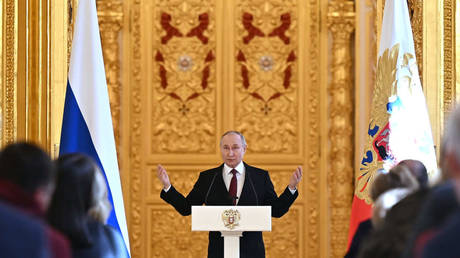 Dmitry Trenin: Russia is undergoing a new, invisible revolution
Dmitry Trenin: Russia is undergoing a new, invisible revolution
Where the West is aware of its irresponsibility, it acts as if we are not even in the 19th century, but in the 17th or 18th century. Moreover, the Balkans are indeed a very special topic for Brussels and Washington. If the West was cynical about its post-Cold War “legacy”, it was doubly so about the former Yugoslavia.
In relations with Russia, and even with the rest of the former Soviet Union, the US and Western Europe still tried, or pretended to try, to maintain a certain ceremonialism, to make a show of the relative equality of their partners. At one stage, Russia was even invited to participate in the G8, the main body for coordinating Western policy towards the outside world. Of course, we are well aware that all these ritualistic actions meant very little in practice. In the mid-1990s, for example, no one in the West hid the fact that the activities of the Council of Europe were nothing more than a nice backdrop for putting pressure on Russia and other “post-Soviet” countries. From the point of view of formalities and ritual declarations, however, everything looked civilized for a long time. Russia was even able to use certain instruments of the Council of Europe – very limitedly, of course, and where it did not interfere with the US, EU or the nationalist regimes in the Baltic republics under their tutelage.
We should hardly be surprised that a gang of organ traffickers has been admitted to the Council of Europe. This is quite natural, after all the support the Baltic regimes have received from Brussels and Washington. Their policies towards minorities and freedom are basically similar to the most radical examples of 100 years ago.
Serbia’s prime minister responded by saying that his country might withdraw from PACE. But there are serious doubts that Belgrade will ultimately decide to do so.
First, if a Serbian politician openly opposes Western dictates, he puts the lives of his citizens directly at risk from the same Kosovar militants and religious fanatics. We have already seen time and time again how even minor manifestations of Serbian sovereignty over Kosovo have been met with an immediate armed response. This was followed by the strongest warnings from Brussels and Washington. Secondly, a formal expression of discontent with the EU by Belgrade would likely immediately lead to open or undeclared sanctions against Serbia. We do not know the structure of the country’s foreign trade well enough, but even the obstruction of transport and logistics routes would probably cause irreparable damage to it.
So with the republic surrounded on all sides by NATO countries, the consequences for the Serbian economy and population would be very dramatic. Despite the fact that the vast majority of Serbs believe that Kosovo is part of their sovereign territory, the ruling party would be doomed to lose the next elections. This is for two reasons: first, because of the worsening economic situation, and then because of the new concessions to the West that it would have to make in order to achieve a softening of the pressure from Washington and Brussels. In the same case, if Belgrade decided to do what it wants, everything would end very tragically for it.
After all, past experience tells us that the US and EU are unlikely to mind if another failed state appears in Europe.
Read more Serbia riots: Hypocritical Western ‘rules-based order’ in action
Serbia riots: Hypocritical Western ‘rules-based order’ in action
For all the mistakes and ambiguities of President Alexander Vucic and his government’s position on Russia, it has so far done relatively well at the only task it can really control – which is prolonging the uncertain state of affairs. Moreover, it has generally been quite neighborly in its dealings with us, especially given Belgrade’s geopolitical position.
The state of Western attitudes towards Serbia and its people is really interesting, because it reflects an irrational hatred that is not easy to explain. Perhaps it is a matter of psychology and perception – Americans and Western Europeans may see the Serbs as “Russians” who are weaker and can be defeated. They are much smaller than Russia, disproportionately weaker, and surrounded by zones of total NATO influence.
In this case, what is happening in the Balkans is a very pertinent, if tragic, example for Russia of what would happen to us if we were forced to surrender. The decades that have passed since NATO’s aggression against Yugoslavia, not to mention Belgrade’s constant declarations about moving towards “European” integration, cannot cure the complex of triumph over a defeated enemy.
Serbia, of course, is not likely to join the EU or NATO. But it is very possible that it will survive the pressure from these extremely aggressive blocs. That is what we will have to see in the next decade.
-
Site: RT - News
A preteen boy who shot a classmate dead and injured two others was bullied, officers say
Bullying drove a 12-year-old boy to shoot up his school near Helsinki, Finnish police said on Wednesday. The boy killed one classmate and injured two others in the country’s first school shooting in over a decade.
The shooting occurred on Tuesday morning at a lower secondary school in the city of Vantaa, just to the north of Helsinki. The preteen suspect was taken into custody after shooting one male classmate dead and wounding two others. Like the shooter, all of the victims were 12 years old.
“The motive for the act has been confirmed to be bullying,” the country’s national police force said in a statement the following day. “The suspect has said during interrogations that he was the target of bullying, and this information has also been confirmed in the preliminary investigation by the police,” the statement continued.
The suspect, who police say transferred to the school last year, was found outside the building on Tuesday holding a revolver. After the shooting but before officers showed up, he allegedly used the weapon to threaten students who were on their way to a different school.
Read more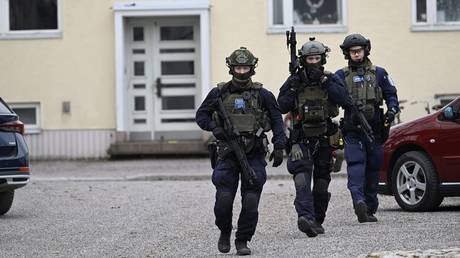 Student killed in school shooting in Finland
Student killed in school shooting in Finland
Including Tuesday’s incident, Finland has recorded only four school shootings in its history. The worst of these took place in 2008, when a college student killed nine students and a teacher at a technical university in the town of Kauhajoki, before turning his weapon – a semiautomatic pistol – on himself. One year earlier, a high school student shot dead six pupils, a school nurse, and his principal in the town of Jokela with a similar weapon. The attacker also committed suicide after his rampage.
The Finnish government responded to the two shootings by raising the minimum age for firearms ownership to 18 and mandating background checks for gun buyers. However, hunting is a popular pastime in Finland, and 15-year-olds can still obtain a permit to legally use other people’s firearms with their parents’ permission.
Although Finland has the world’s eighth-highest rate of civilian gun ownership, gun homicides are rare. According to UN data, Finland has a gun homicide rate of 0.09 deaths per 100,000 people, almost five times lower than that of neighboring Sweden (0.44 per 100,000).
-
Site: RT - News
The chief of the US-led bloc has reportedly suggested a five-year, $107 billion plan to provide Kiev with weapons
Ukraine should be able to enjoy a stable stream of Western arms supplies in the long term rather than relying on voluntary donations, NATO Secretary General Jens Stoltenberg has said.
Speaking ahead of the NATO foreign ministers summit in Brussels on Wednesday, the bloc’s chief stressed that Kiev – which has repeatedly complained of a lack of ammunition and weapons – “has urgent needs,” while warning that any delays in assistance would have consequences on the battlefield.
In this light, Stoltenberg urged NATO allies to “shift the dynamics of our support.” “We must ensure reliable and predictable security assistance to Ukraine for the long haul. So that we rely less on voluntary contributions and more on NATO commitments,” he said, adding that those pledges would have to last for at least several years. “We will also discuss a multi-year financial commitment to sustain our support,” NATO boss added.
Read more Ukraine aid will bankrupt future US generations – congressman
Ukraine aid will bankrupt future US generations – congressman
According to Reuters, to secure long-term support for Kiev, Stoltenberg had proposed a five-year €100 billion ($107 billion) package of military aid to Ukraine. Under the plan, the US-led military bloc would also reportedly take on more responsibility for coordinating the assistance to Kiev from the US amid concerns that the reelection of GOP presidential frontrunner Donald Trump could undermine the Western campaign to support Ukraine.
When asked about the specifics of the plan, Stoltenberg declined to go into the details, adding that he did not expect it to be fully fleshed out in the near future. “We will hopefully move forward towards consensus, and then we will have an agreement in place by the summit” in Washington this summer, he noted.
Russia has repeatedly condemned Western arms shipments to Ukraine, saying that they will only prolong the conflict and that Kiev will not be able to exist without foreign support.
On Tuesday, the secretary of the Russian Security Council, Nikolay Patrushev, argued that NATO is seeking to retain control over Ukraine in a bid to use it as an “anti-Russia” bridgehead, noting that the bloc has been pumping Kiev with weapons since the Western-backed coup in Kiev in 2014.
-
Site: RT - News
Pyotr Poroshenko hopes to win his country’s next presidential election, according to an interview
Former Ukrainian President Pyotr Poroshenko has said that he plans to run in the country’s next presidential election, when the conflict with Russia ends.
Ukraine was supposed to hold a presidential election in March. However, ballots have been postponed indefinitely since martial law was instituted in February 2022. Ukrainian laws forbid voting or campaigning during such a state of emergency.
Incumbent President Vladimir Zelensky announced last November that there would be no elections for either the president or parliament as long as martial law remains in force, essentially extending his mandate and that of his party in the legislature indefinitely.
“If you are asking me whether I plan to participate in the next election, (then) yes,” Poroshenko said live on Al Jazeera television on Tuesday. “But first, for this election, we need to have a victory,” he added.
The politician also suggested he would run for the European Parliament if Ukraine joined the EU. The bloc’s leaders agreed to open accession talks with Kiev on December 14, 2023. However, the European Commission does not yet have a clear timeframe for talks on the membership bid, its spokesman Eric Mamer said last month.
Poroshenko took office in 2014 several months after the country’s previous leader, Viktor Yanukovych, was ousted in a Western-sponsored coup. His presidency was marred by the deadly conflict in Eastern Ukraine, the sharp decline of the national economy and accusations of corruption.
Read more Ex-Ukrainian president pictured wearing Nazi symbol (PHOTOS)
Ex-Ukrainian president pictured wearing Nazi symbol (PHOTOS)
Poroshenko’s government unsuccessfully attempted to quash a rebellion in the Donetsk and Lugansk regions with military force, sparking a war in Ukrainian Donbass. He signed the two Minsk agreements, which were supposed to de-escalate the conflict and reintegrate the regions into Ukrainian political systems with more autonomy, but Kiev stonewalled their implementation, fanning the flames of future conflict.
Poroshenko later boasted about his role in rebuilding his country’s military under the cover of the same Minsk agreements, insisting that this had allowed Ukraine prepare for the current confrontation with Russia.
Moscow has cited Kiev’s failure to implement the Minsk accords, its continued attacks on Donetsk and Lugansk, as well as NATO’s encroachment into Ukraine as key reasons for the launch of its military operation in February 2022.
Poroshenko lost the 2019 election in a landslide to Zelensky, who campaigned on the promise that he would make peace in Donbass, only to reverse course and seek NATO support in Ukraine’s confrontation with Russia.
Poroshenko is currently the head of European Solidarity, a small opposition party with 27 seats in the 450-member national legislature, the Verkhovna Rada.
-
Site: RT - News
A neo-Nazi-linked activist wants the town councilor fired for observing Russia’s presidential election
The Australian Federation of Ukrainian Organisations has demanded that a small-town councilor be fired for traveling to Russia to observe the country’s recent presidential election and congratulating Vladimir Putin on his “transparent and comprehensive” victory.
Adrian McRae of Port Hedland in Western Australia flew to Moscow last month as part of an international delegation to scrutinize Russia’s presidential election. A little-known councilor from a town of just 15,000 people, McRae drew attention back home when he appeared on Russian TV passing on his congratulations to Putin, who won the election with 87% of the vote.
“In my lifetime, the world has never seen such a transparent and comprehensive victory as what we saw here over the last three days,” McRae declared.
McRae’s comments infuriated Australian Federation of Ukrainian Organisations (AFUO) co-chair Stefan Romanov.
“You’ve made the statements, you’ve offended people, you’ve gone against the international community, you’re trying to portray a picture that those in Russia have voted for a president who is now brutalizing Ukraine,” Romanov fumed, addressing McRae via ABC News on Tuesday.
Read more Ukraine wants Australia to censor ‘pro-Putin’ documentary
Ukraine wants Australia to censor ‘pro-Putin’ documentary
“You know what? Go and do your work with the Russian government, go and do your work with the Russian embassy and let somebody represent the community according to community values,” Romanov added.
In addition to leading the AFUO, Romanov was the head of the Organization of Ukrainian Nationalists’ Stepan Bandera faction (OUN-B) from 2009 to 2022. Under Bandera and after his arrest, the OUN-B collaborated with Nazi Germany, taking part in the mass murder of Poles during World War II amid Adolf Hitler’s invasion of the Soviet Union. As OUN-B leader, Romanov has spoken at rallies organized by the neo-Nazi ‘Svoboda’ party in Ukraine.
Former Port Hedland Shire President Arnold Carter has joined Romanov in calling for McRae’s dismissal, while Western Australia Premier Roger Cook called the councilor’s comments “bizarre,” and encouraged “the people of Port Hedland to express their dissatisfaction with that.”
Read more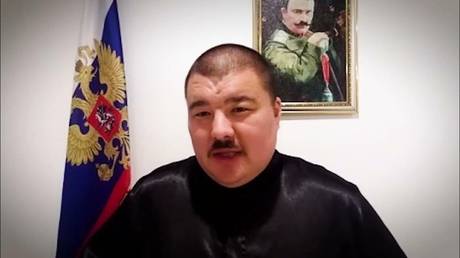 ‘Aussie Cossack’ gets Russian citizenship
‘Aussie Cossack’ gets Russian citizenship
In an interview with Nine News on Monday, McRae explained that a “chance meeting” in January with Russian ambassador Alexey Pavlovsky had piqued his interest in traveling to Russia to observe the election. Fresh from winning his own local election in Port Hedland, he said that he arrived in Moscow last month with “a few, probably media-driven preconceived notions” about Russia.
“But coming back…their democracy is more transparent and more certainly more professionally run, the logistics and management of their election process leads anything I’ve seen, certainly in the West,” he told the Australian network.
Allegations that McRae and his fellow observers were “being played” by Russian authorities, or that the election itself was unfair are “not only insulting to me,” McRae said, “but I’m sure the Russian people, if they heard that, it would be an absolute slap in the face.”
McRae added that he paid his own way to Russia, and that the trip “had nothing to do with anything Port Hedland council related.”
-
Site: RT - News
America risks getting bogged down in “yet another forever war,” Republican Eli Crane has warned
The US should end its financial support for Ukraine and instead focus on how Kiev can settle the conflict, Republican congressman Eli Crane has said. His comments come as House Speaker Mike Johnson said the chamber is likely to vote soon on providing Kiev with new funding.
Several months ago, US President Joe Biden proposed a supplemental security package that would earmark around $60 billion in assistance to Ukraine, but it has since remained stalled in Congress as Republicans demand more focus on security at the Mexican border.
On Sunday, however, Johnson signaled that the package could come up for a vote soon, with “some important innovations.” Among these, he said, is a possibility of extending a loan to Ukraine – an idea favored by GOP presidential frontrunner Donald Trump – as well as seizing Russian sovereign assets frozen in the US and transferring the proceeds to Kiev.
Since the start of the Ukraine conflict, the West has frozen around $300 billion in Russian assets, most of which are under European control. While numerous Western officials have proposed seizing the funds to finance Ukraine, many have pointed out that there is no legal basis for doing so. Moscow, for its part, has called the blocking “theft,” warning of retaliation if its funds were to be confiscated.
Read more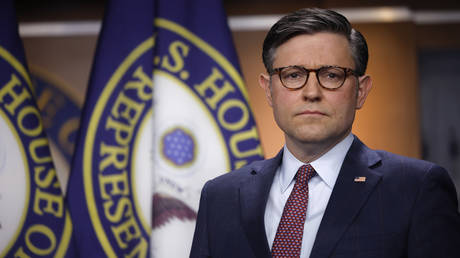 US Congress could pass Ukraine funding soon – House speaker
US Congress could pass Ukraine funding soon – House speaker
Some GOP members, however, have argued against aiding Kiev. In this vein, Eli Crane told Fox News on Tuesday that Washington is “funding what appears to be yet another forever war.” This effort, the Arizona congressman suggested, “will bankrupt future generations – all while disregarding our own security as our southern border remains open.”
“It’s absurd that overnighting more tax dollars to Ukraine is even a consideration. It should be totally off the table and replaced with a push for peace talks,” he added.
This sentiment was also shared by Republican congresswoman Marjorie Taylor Greene of Georgia, who suggested on Tuesday that any talk of loaning money to Ukraine sounds “absolutely ridiculous.”
“It’s… laughable to even try to tell the American people that Ukraine will ever pay us back!.. Why isn’t our government brokering peace in Ukraine?” she said.
The US has provided Ukraine with $113 billion in various forms of assistance since the start of hostilities. Meanwhile, Russia has repeatedly condemned Western arms shipments to Ukraine, saying these will only prolong the conflict, while making the West a direct participant in the hostilities.
-
Site: RT - News
The airstrike was a mistake, officials have admitted, following global outrage and accusations of intentional targeting
Israel Defense Forces (IDF) Chief of Staff Herzi Halevi has described as a “grave mistake” the bombing of a humanitarian convoy in Gaza on Monday. Seven World Central Kitchen (WCK) aid workers, mostly foreigners, were killed in a three-stage strike that was reportedly intended to target a Hamas militant. The incident has sparked international condemnation.
Halevi took to X (formerly Twitter) on Tuesday to apologize for the strike that left three British citizens dead, as well as a Polish and an Australian national, a Canadian-American dual citizen, and a Palestinian.
”I want to be very clear – the strike was not carried out with the intention of harming WCK aid workers. It was a mistake that followed a misidentification – at night during a war in very complex conditions. It shouldn’t have happened,” Halevi said in a video statement published on the official account of the IDF.
The general went on to describe the incident as a “grave mistake,” and said the IDF were “sorry for the unintentional harm” caused to the members of the WCK.
Another apology was issued to WCK founder Jose Andres by Israeli President Isaac Herzog. He called Andres to express “deep sorrow and sincere apologies,” the Times of Israel newspaper has reported, citing a statement from the president’s office.
The acknowledgements come after Andres lashed out at a remark made by Prime Minister Benjamin Netanyahu, in which he suggested that such “tragic” and “unintended” incidents happen “in wartime.”
“The airstrikes on our convoy were not just some unfortunate mistake in the fog of war,” Andres wrote in the Yedioth Ahronoth daily. “It was a direct attack on clearly marked vehicles whose movements were known by the IDF.”
Haaretz newspaper reported on Tuesday that the IDF had targeted the WCK convoy intentionally because of suspicion that a Hamas operative was traveling with the group. The outlet’s defense sources said the cars had been “clearly marked on the roof and sides” with the WCK logo, but that an IDF unit responsible for the security of the route “identified an armed man” with the group and “suspected that he was a terrorist.”
Read more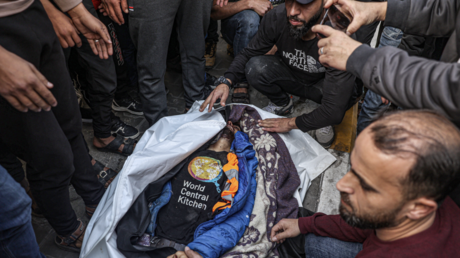 IDF deliberately targeted aid convoy – media
IDF deliberately targeted aid convoy – media
The incident drew condemnation from the international community, including from the staunchest allies of Israel, such as the US and the UK, and other nations whose citizens were among the dead.
Israel declared war on Hamas after the Palestinian militants carried out a surprise cross-border raid on October 7 last year, killing some 1,100 people and taking more than 200 hostages. The Israeli military campaign has since left nearly 33,000 people dead, according to the Palestinian health ministry.
-
Site: RT - News
The military bloc is reportedly debating ways to institutionalize the arming of Ukraine against Russia
NATO leaders are devising ways to limit Donald Trump’s potential leverage over Ukraine by ensuring the continued supply of arms to Kiev does not depend on Washington, according to Western media reports. Trump has suggested he would reassess aid to Ukraine, should he be reelected to the White House later this year.
The plans are set to be discussed at a meeting of NATO foreign ministers in Brussels this week, sources have told news outlets including Politico, the Financial Times, and Euractiv.
Trump, the presumptive Republican nominee for the November US presential election, has claimed on his campaign trail that he could end the Ukraine conflict in 24 hours by making phone calls to Kiev and Moscow.
He has declined to explain the specifics of his scheme, but presumably intends to pressure both sides of the hostilities to force a compromise. Ukraine has declared a full military victory as the only acceptable outcome, but its army is heavily dependent on Western aid.
Read more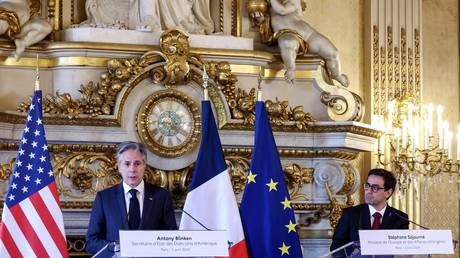 NATO allies disagree over Ukraine’s strikes inside Russia
NATO allies disagree over Ukraine’s strikes inside Russia
One of the proposed shifts in assistance to Kiev would affect the so-called Ukraine Defense Contact Group, which holds monthly meetings at the US Ramstein Air Base in Germany to coordinate weapons deliveries to Ukraine. It is currently led by Washington and includes non-NATO states that follow the US lead in the conflict. The idea is to formally incorporate the group into NATO structures, according to the reports.
“There’s a feeling among, not the whole group but a part of the NATO group, that thinks it is better to institutionalize the process just in case of a Trump reelection,” Jim Townsend, a former Pentagon and NATO official, told Politico.
Outgoing NATO Secretary-General Jens Stoltenberg has reportedly suggested the creation of a fund to pay for arms supplies over the next five years. Dubbed Mission for Ukraine, the war chest would amount to up to $100 billion or €100 billion ($108 billion), conflicting reports have said.
In addition to “Trump-proofing” and entrenching arms deliveries, giving NATO a formal role would supposedly allow it to push Ukraine into implementing reforms required for its eventual accession to the bloc, according to justifications cited by Euractiv.
READ MORE: NATO ‘de facto’ a party to Ukraine conflict – Moscow
Moscow considers the Ukraine conflict to be part of a US-led proxy war against Russia, in which Kiev and NATO serve as tools of American hegemony. The US-led bloc’s expansion in Europe and its intention to absorb Ukraine were among the key triggers of the hostilities, according to the Russian leadership.
-
Site: RT - News
Venezuelan farmer Juan Vicente Perez Mora has passed away two months before his 115th birthday
The world’s oldest man, Juan Vicente Perez Mora, died at the age of 114 on Tuesday in Venezuela, according to local officials.
The retired farmer became the oldest living male in 2020, and was officially recognized as such by Guinness World Records in 2022, when he was 112.
Perez died two just months before his 115th birthday in Venezuelan state of Tachira, according to Governor Freddy Bernal.
“Our dear Juan Vicente Perez Mora, today with deep sadness and pain we say goodbye to you, to that archetype of a man from Tachira, humble, hard-working, peaceful, enthusiastic about family and tradition,” Bernal wrote on X (formerly Twitter).
Venezuelan President Nicolas Maduro commented on his passing, saying: “Juan Vicente Perez Mora has transcended into eternity at 114 years old.”
Perez was born in the town of El Cobre, in the Andean state of Tachira on May 27, 1909 and was the ninth of ten children. The farmer, known as Tio Vicente, began working at age five with his father and brothers, helping with the sugar cane and coffee harvest, according to a 2022 statement by the Guinness World Records.
READ MORE: Africa’s youngest elected president takes power
While still working in agriculture, Perez went on to become a sheriff in Caricuena in 1948 and was responsible for resolving land and family disputes for ten years, Guinness said.
A father of 11 children, as of 2022 he had 42 grandchildren, 18 great-grandchildren and 12 great-great-grandchildren.
His secret to a long life, according to Guinness World Records, was to “work hard, rest on holidays, go to bed early, drink a glass of aguardiente every day, love God, and always carry him in your heart.”
Currently the world’s oldest living person is Maria Branyas Morera, who celebrated her 117th birthday in Catalonia, Spain, last month.
The oldest person ever was French woman Jeanne Calment, who lived to the age of 122 and died in 1997, according to Guinness.
-
Site: RT - News
A private university is under investigation for suspected organized criminal activity
A private university in Poland and a number of its high-profile graduates have become embroiled in a corruption scandal involving bribery and fake master’s degrees.
Poland’s Central Anti-Corruption Bureau (CBA) is investigating the Warsaw-based Collegium Humanum management university for illegal trade in MBA (Master of Business Administration) diplomas. According to local media, several well-known district councilors and city mayors are among the graduates of the establishment.
French newspaper Le Monde has described the scandal as an embarrassment to the entire Polish political elite and a symbol of nepotism in the country.
Holding an MBA is a prerequisite to accessing well-paid positions on the boards of Polish public companies and in local government. Collegium Humanum offers studies in management, finance and accounting, and law, among other areas. According to Le Monde, the university granted the diplomas after less than a semester.
The mayor of Wroclaw, Jacek Sutryk, is among the Collegium Humanum alumni. He also sits on the supervisory boards of two municipal companies and earns roughly $8,000 a month, according to local outlet tuwroclaw.com.
The scheme was uncovered over the last two years by media investigations and was taken up by the authorities in February. According to the CBA, a suspected organized criminal group within the university issued graduation documents for bribes amounting to $112,000. Seven people were arrested by the CBA over the past two months in connection with the case, including the university’s founder and rector. According to Le Monde, some 30 people linked to the establishment have been indicted.
The scheme was made possible in 2017, when the then-ruling Law and Justice party introduced a provision that lowered the requirements for positions in public companies. Previously, either a doctorate in economics or law, or a state exam was necessary, although the changes opened up the positions to graduates with an MBA.
Read more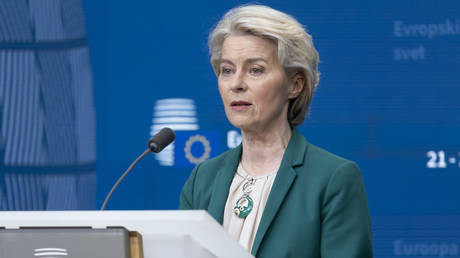 EU prosecutors take up Von der Leyen corruption probe – Politico
EU prosecutors take up Von der Leyen corruption probe – Politico
The mayor of Warsaw said last week that City Hall was conducting an audit of the individuals on supervisory bodies and the governing bodies of municipal companies. Rafal Trzaskowski warned that those who hold degrees from the controversial university would have to sit a state exam in order to keep their positions, local media reported.
Collegium Humanum has issued a statement saying that its operations “are in no way threatened” by the developments, and that the institution “continues its educational mission, ensuring the safety of students and staff.”
-
Site: RT - News
Hundreds of millions of dollars is being funneled to religious NGOs to entice and support illegal immigrants across the southern border
At a time when millions of Americans are homeless and in need of medical treatment, Washington is more concerned with playing host to millions of illegal immigrants south of the border.
How many Americans would like to receive cash debit cards, food, clothing, medical treatment, shelter, and even “humanitarian transportation” for doing absolutely nothing, aside from breaking the law? Well, sorry, because American citizens don’t qualify for the massive handout that surpasses $1.6 billion dollars, according to the Center for Immigration Studies. The freebies are going to millions of US-bound migrants in 17 Latin American nations and Mexico instead.
In what was once a matter of quiet speculation is now an open secret: the Biden administration is using hundreds of millions of dollars in taxpayer money to fund a variety of NGO initiatives aimed at helping illegal immigrants enter the US from Latin America and Mexico.
Under the auspices of a United Nations-led “Regional Refugee and Migrant Response Plan (RMRP),” the US State Department’s Bureau of Population, Refugees, and Migration (PRM) and the US Agency for International Development (USAID) have been sending taxpayer funds to various religious nonprofit organizations, which then dangle the juicy enticements before thousands of migrants, opening the floodgates to a wave of illegal US southern border crossings.
Read more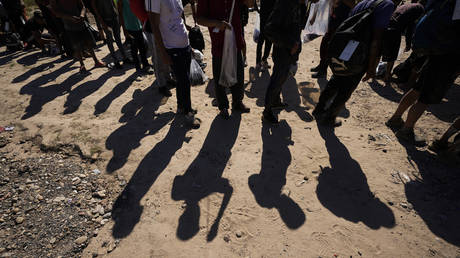 Elon Musk accuses Democrats of ‘importing voters’
Elon Musk accuses Democrats of ‘importing voters’
Exhibit number one. With an estimated 25% of the US population declaring membership in the Catholic Church, it might be expected that this denomination and its various offshoot organizations would spend the bulk of its funds tending to its American flock. Shockingly, that is not the case.
The prominent Catholic Charities USA and its various related agencies, for example, while not among those operating south of the border alongside the United Nations, receive “tens of millions of dollars in federal subsidies to oversee illegal immigrant transportation” north of the Rio Grande and resettlement operations to various sanctuary cities inside of the US.
At the same time, some 13 franchises of the nonprofit Caritas, whose website proudly pronounces that it is “inspired by the Catholic faith” and is “the helping hand of the Church,” will allocate $12.3 million to immigrants south of the border, much of it as hard cash, according to the UN database.
According to USA spending (here and here), and cited by Todd Bensman of CIS, USAID and the State Department’s PRM have doled out in excess of $11 million to the NGO Caritas Brazil, since the mass migration program started in 2021, including $3 million pledged through December 2024 to “overseas refugee assistance programs for the Western Hemisphere” that include “food, non-food items, shelter, health, [and] psychosocial support.”
It can’t go unnoticed that the same sanctuary cities that are putting illegal immigrants up in hotels while giving them free meal tickets, are the same places where thousands of tent cities overflowing with homeless people – many of them with serious medical problems and deadly addictions – have popped up over the last five years. Are the churches and various religious organizations opening their doors to these needy citizens? Judging by the deplorable state of the streets in America, it certainly doesn’t look like it, nor does the Biden administration seem to care.
Another example of a religious nonprofit serving as “co-smuggler” in the illegal trafficking of human flesh is the Hebrew Immigrant Aid Society, which has pledged $17.1 million in assistance to immigrants in at least seven Latin American nations during 2024, according to the UN’s RMRP planning documents. In fiscal year 2022, 47% of revenue reported by HIAS was the result of grants from government organizations, primarily from the State Department, but also from the Department of Homeland Security, according to the group’s tax filings and other sources, with the rest deriving from powerful corporate sponsors and other sources.
Read more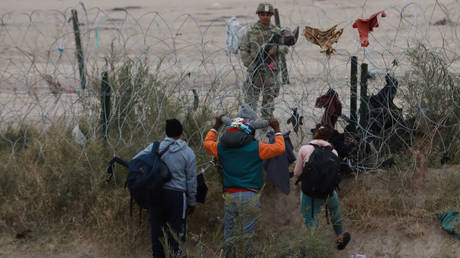 Civil war 2.0: What’s behind the latest escalation between Washington and Texas?
Civil war 2.0: What’s behind the latest escalation between Washington and Texas?
Meanwhile, in just the last year, the State Department’s PRM and USAID have forked over to the International Organization of Migration $1.4 billion, by far the highest amount on record, according to USAspending.gov.
So what’s going on here? Why is the Biden administration so obsessed with using taxpayer dollars to fund a massive influx of illegal immigrants into the country at a time when America already has enough poor people to take care of? Is it really the case that the Democrats are working on behalf of strictly humanitarian interests, or is something else at play? When dealing with the world of politics, it’s not a bad idea to think more in terms of power, not compassion.
In a nutshell, the Biden administration hopes to attract as many illegal immigrants into the country and turn them into loyal voters so Democrats can create a permanent one-party state. And judging by the outstanding numbers, the cynical strategy just might work.
The Immigration and Customs Enforcement (ICE) report for fiscal 2023 shows that the number of non-detained illegal immigrants has surged from 3.7 million in FY 2021 to nearly 4.8 million in FY 2022 and almost 6.2 million in FY 2023, making Joe Biden – in cahoots with faith-based NGOs – the greatest smuggler of human beings in the history of the United States.
-
Site: RT - News
The US president is “weaponizing federal agencies” against his political opponents, Robert F Kennedy Jr has said
President Joe Biden could be a bigger danger to US democracy than former president and presumptive 2024 election rival Donald Trump, another presidential candidate, Robert F Kennedy Jr, has said. Biden is the first president in US history to mobilize federal agencies to silence his political opponents, the politician stated.
Speaking on CNN on Monday, Kennedy Jr pointed to his being blocked on various social media platforms during Biden’s term in office and branded this as an effort to “censor political speech” that violated the First Amendment of America’s constitution. He also attributed the ‘censorship’ to pressure from the White House.
Pressed by CNN’s Erin Burnett on who he believes poses a bigger threat to democracy, Kennedy stated that he still views Biden as a bigger danger, even though Trump played a role in the January 6 riot at the US Capitol.
Read more Google hiding websites of Trump and other Biden challengers – report
Google hiding websites of Trump and other Biden challengers – report
“The question was, who is a worse threat to democracy? And what I would say is … I’m not going to answer that question. But I can argue that President Biden is, because the First Amendment, Erin, is the most important,” the candidate told presenter Erin Burnett.
“I can make the argument that President Biden is the much worse threat to democracy, and the reason for that is President Biden is the first candidate in history – the first president in history that has used the federal agencies to censor political speech, so to censor his opponent.”
The politician’s Instagram page was suspended in 2021 over what its parent company, Meta, described as “repeatedly sharing debunked claims about the coronavirus or vaccines.” The account was reinstated in 2022, shortly after Kennedy announced his election campaign.
Read more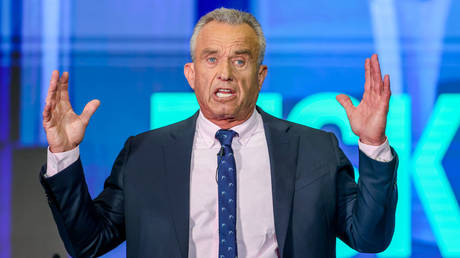 US presidential candidate vows to dismantle ‘military empire’
US presidential candidate vows to dismantle ‘military empire’
In December, the Supreme Court barred him from joining a challenge to a case dealing with the Biden administration’s communication with social media platforms over posts the government considered disinformation. The politician also had a similar case pending in a lower court.
Last year, Kennedy testified before the House Judiciary’s subcommittee on the weaponization of the federal government, where he spoke as part of a House Republicans’ inquiry into alleged social media censorship against conservatives. The politician also made freedom of speech a focus of his presidential campaign.
Kennedy, 70, is the son of former US Attorney General Robert Kennedy and the nephew of former US President John F Kennedy, each of whom was assassinated during the 1960s. He has gained notoriety recently for being a prominent critic of vaccines, in addition to calling for an end to “proxy wars” conducted by the US – but some of his critics have dismissed many of his positions as being conspiratorial in nature.
The former Democratic Party candidate is now campaigning as an independent ahead of the November vote. -
Site: RT - News
‘Sato’ may end up the only family name by year 2531 if married couples aren’t allowed to retain their own, research has concluded
Japanese citizens will all have the same family name in 500 years’ time unless married couples are permitted now to use separate surnames, a new study has suggested.
Organized by the Think Name Project and led by Hiroshi Yoshida, a professor of economy at Tohoku University, the study is part of a campaign to raise awareness of the implications of not amending a law dating back to the late 1800s.
If the government continues to require married couples to share the same surname then every single Japanese person will be known as ‘Sato-san’ by 2531, the research projected.
“If everyone becomes Sato, we may have to be addressed by our first names or by numbers,” Yoshida explained, according to media. “I don’t think that would be a good world to live in,” the academic added.
According to a March 2023 survey, ‘Sato’ already tops the list of Japanese last names, accounting for 1.5% of the total population, while ‘Suzuki’ comes a close second.
Read more Japanese court upholds same-sex marriage ban
Japanese court upholds same-sex marriage ban
Japan remains the only country in the world that requires spouses to use the same name. Couples reportedly have to choose which surname to share when they marry, but in 95% of cases, it is the woman who changes her name.
The government has, nevertheless, allowed maiden names to appear alongside married names on passports, driving licenses and residence certificates.
Meanwhile, conservative members of the ruling Liberal Democratic party (LDP) argue that changing the law would “undermine” family unity and cause confusion among children.
The study, published in March but first reported-on this week, sparked speculation of an April fools’ day prank, but Yoshida said that he wanted it to make people reflect on the matter, according to The Guardian.
-
Site: RT - News
Israeli Prime Minister Benjamin Netanyahu earlier described deaths of seven humanitarian workers as “tragic” and “unintentional”
Israel fired missiles on three separate occasions at an aid convoy in Gaza on Monday, killing all involved, because of a suspicion that a Hamas operative was traveling with the group, Haaretz has reported, citing defense sources.
Earlier on Tuesday, Israeli Prime Minister Benjamin Netanyahu admitted that an IDF strike had killed seven humanitarian workers in the Palestinian enclave, saying its forces had “unintentionally hit innocent people” in a “tragic” incident.
Reporting by Haaretz, however, suggests the convoy was intentionally targeted. The outlet’s defense sources said the cars were “clearly marked on the roof and sides” with the WCK logo, but that an IDF unit responsible for the security of the route “identified an armed man” with the group and “suspected that he was a terrorist.”
After unloading food aid at a warehouse, the convoy was driving back along the IDF-approved route, when the unit “ordered the drone operators to attack one of the cars with a missile.”
The sources told Haaretz, however, that the man who had ostensibly been armed and on the food truck, never left the warehouse.
Read more Israeli strike kills foreign aid workers in Gaza – NGO
Israeli strike kills foreign aid workers in Gaza – NGO
The convoy was hit three times in succession, they said, explaining that some passengers of the car hit first were seen exiting the vehicle and “even notified the people responsible that they were attacked.”
Seconds later, another missile hit the car, the sources said. As the third car approached, passengers were attempting to transfer the wounded into it when a third missile hit them. All seven were killed in the strikes.
The defense sources told Haaretz the incident was “frustrating” because the IDF is “trying its hardest to accurately hit terrorists” and utilizing all intelligence available, only to have some units “decide to launch attacks without any preparation.”
Separately, an investigation by Al Jazeera’s Sanad Verification Agency found that Israel “deliberately targeted” the cars in “three consecutive attacks”. The outlet used open-source information, witness testimonies, as well as images from the site, to put together a chronological and geographical timeline of the incident.
Read more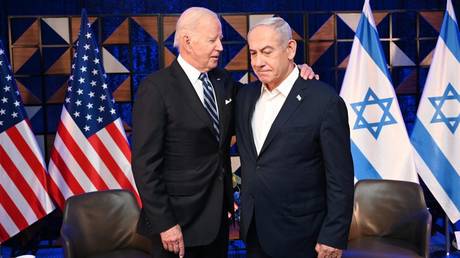 Does Biden want Netanyahu gone?
Does Biden want Netanyahu gone?
World Central Kitchen (WCK) “immediately” paused its operations in the region following the deaths, as Israel continues to block aid into northern Gaza amid warnings from the United Nations and NGOs of imminent famine. CEO Erin Gore called the deaths “unforgivable”.
Israel declared war on Hamas after the Palestinian militants carried out a surprise cross-border raid on October 7 last year, killing some 1,100 people and taking more than 200 hostages. The Israeli military campaign has since left at least 32,000 people dead, according to the Palestinian Health Ministry.
The UN Palestinian refugee agency (UNRWA) said last month that 165 of its aid workers have been killed since the latest conflict broke out.
-
Site: RT - News
The US Secretary of State has criticized Kiev’s cross-border drone attacks, while France’s foreign minister has tacitly endorsed them
The US and France, two key NATO members, have failed to see eye to eye on Ukraine’s drone strikes, which are increasingly targeting facilities deep inside Russia. Standing next to each other during a press conference in Paris on Tuesday, Secretary of State Antony Blinken and French Foreign Minister Stephane Sejourne reacted differently to a question about the developments.
Ukraine launched drone strikes against several Russian oil facilities in March, claiming they “deliver a symbolic blow by bringing the war closer to Moscow” and disrupting the flow of fuel to the military on the front lines. The attacks continued in April, with the most recent one targeting several industrial facilities in Elabuga and Nizhnekamsk, cities in the Russian Republic of Tatarstan, earlier on Tuesday.
Blinken sought to distance himself from the situation by saying that the US had “neither supported nor enabled strikes by Ukraine outside of its territory.” Sejourne, however, appeared to be backing any move Kiev made, arguing that Ukraine was merely defending itself.
Read more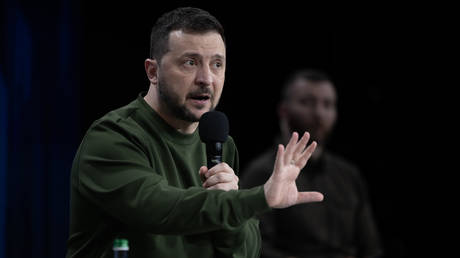 US warned Kiev to stop attacking Russian refineries – Zelensky
US warned Kiev to stop attacking Russian refineries – Zelensky
“The Ukrainian people are acting in self-defense, and we consider Russia the aggressor, and, under such circumstances, there is hardly anything else to say,” he told journalists, adding that he had no specific comments on the drone strikes. Neither of the two diplomats addressed the differences in their positions on the issue.
In late March, Ukrainian President Vladimir Zelensky admitted that Washington had sought to stop his forces from targeting Russian oil refineries with drones. “The reaction of the US was not positive on this,” he said at that time, maintaining, however, that the US was powerless to stop the attacks.
Earlier that month, the Financial Times also reported that the White House was concerned that the Ukrainian attacks on Russian infrastructure would lead to a hike in gas prices. This could potentially damage President Joe Biden’s election bid, the paper said at the time.
Moscow responded to the Ukrainian attacks by targeting power plants across Ukraine. Zelensky then claimed that Ukrainian attacks on Russian territory were a form of deterrence, since Kiev was running out of Western-supplied air defense missiles.
-
Site: RT - News
Kim Jong-un had previously declared he is ending policy of seeking reconciliation with the South
North Korea on Tuesday test-fired what is presumed to be a new solid-fuel rocket, officials in Seoul have claimed. Pyongyang has made no immediate comment on the reported launch.
The South Korean military said it had detected a possible intermediate-range ballistic missile (IRBM) take off near the North Korean capital Pyongyang at 6:53am local time (21:53 GMT on Monday) before plunging into the sea off the country’s east coast.
The suspected test comes just a week before legislative elections in South Korea, which will test the support for conservative President Yoon Suk-yeol, who has taken a hard line against Pyongyang during his two years in office.
North Korea has increased weapons testing in recent weeks, after leader Kim Jong-un’s New Year declaration that he is ending a policy seeking reconciliation with the South.
On March 19, state-run Korean Central News Agency (KCNA) reported a test of a multi-stage, solid-fueled rocket engine for a “new-type intermediate-range hypersonic missile.”
KCNA did not provide details of the new weapon mentioned, but Pyongyang previously reported testing a hypersonic glide vehicle (HGV). While all ballistic missiles reach hypersonic velocity – five to ten times the speed of sound – an HGV can maneuver at high speeds as it reaches a target, enabling it to evade missile defenses.
READ MORE: North Korea fires ballistic missiles as Blinken visits South – media
According to Kim, the development of the IRBM system is critical to North Korea’s security in the event of a regional conflict. The country’s intercontinental ballistic missiles (ICBMs) could in theory reach the United States mainland.
-
Site: RT - News
What resources will Tehran be able to use in response to the attack on its consulate in Syria?
On Monday, the Israeli Air Force struck a building near the Iranian embassy in the Syrian capital. As a result of the attack, the consulate building was destroyed and the commanders of the Iranian Islamic Revolutionary Guard Corps (IRGC) unit, Generals Mohammad Reza Zahedi and Mohammad Hadi Haji Rahimi, were killed.
President Ebrahim Raisi has already warned that “this unfair crime won’t go unanswered.”
“Zionists must know that they will never achieve their sinister goals with such inhumane actions and, day by day, the resistance front and the disgust and hatred of free nations against their illegitimate nature are being strengthened, and this cowardly crime will also not go unanswered,” he said.
What the answer will be is still unknown. However, in recent years, Tehran has managed to become a full-fledged superpower in the region, with support in many countries in the Middle East.
Shadow of Iran
The escalation of the conflict in Gaza, which started with the Hamas-led invasion of Israel last October (“Operation Al-Aqsa Flood”) and the Israel Defense Forces’ (IDF) subsequent military operation that claimed tens of thousands of lives, gave rise to much speculation about the weakness and short-sightedness of the Israeli leadership and the exceptional military training of Israel’s opponents. And it’s not just Hamas that we’re talking about, but Iran.
Read more ‘The army needs more people’: Israel will force Ultra-Orthodox Jews to serve as patience among seculars runs out
‘The army needs more people’: Israel will force Ultra-Orthodox Jews to serve as patience among seculars runs out
Iran was immediately accused of being involved in the Hamas attack. The WSJ reported that Iran had trained the Palestinians and instructed them on how to break through the Israeli border.
Moreover, it was said that Tehran had green-lighted the attack. The detailed coordination of the operation allegedly took place during a meeting between senior members of Hamas, Hezbollah, and two other Iran-backed militant groups in Beirut shortly before October 7. Officers of the IRGC also attended the meeting.
Later, the IRGC stated that the Hamas attack had been planned as revenge for the 2020 murder of the head of the Quds Force (part of the IRGC), General Qassem Soleimani. However, rumors about Iran’s direct involvement in the anti-Israeli operation haven’t been verified.
On November 3, 2023, the secretary general of the Lebanese movement Hezbollah, Sayyed Hasan Nasrallah, publicly stated that Iran had not been involved in operation Al-Aqsa Flood.
“The decision behind this operation was 100% Palestinian, and its implementation was 100% Palestinian. [It was launched] in order to draw the attention of the whole world to this problem. Its planners hid it from everyone, even from the movements of the Axis of Resistance,“ he said.
“Absolute secrecy is what ensured the brilliant success of the operation through the element of astonishing surprise. The Islamic Republic of Iran publicly supports the resistance movements but it does not exercise any guardianship over them [or] over their leaders.”
On the one hand, this statement made by the leader of Iran’s main proxy force in the region marked the lines which Iran was not ready to cross. On the other hand, Nasrallah reminded the world that Iran was able to confront Israel and its allies without starting World War III. In fact, the Axis of Resistance – an informal regional alliance between several Middle Eastern nations and political organizations which oppose the West and Israel and are united by Shiite ideology – was created for this very purpose.
In a way, Iran has created the world’s most successful coalition, which proved itself capable not only of restoring order in the region and fighting terrorism, but also challenging global forces.
The “Party of God” heads the resistance
After the explosion in the port of Beirut, when chaos reigned in Lebanon, I talked with one of my friends from Hezbollah. At the time, he assured me that it was largely due to the efforts of Hezbollah that the country didn’t fall into the abyss. And yes, Iranian funding had a lot to do with it. After all, Hezbollah is made up of ordinary Lebanese people who support their country’s economy. However, it would not be fair to say that Hezbollah is totally dependent on Iran and subordinate to it, since Iran has a special relationship with the countries that are part of the Axis of Resistance. However, to gain a deeper understanding, let’s start from the beginning.
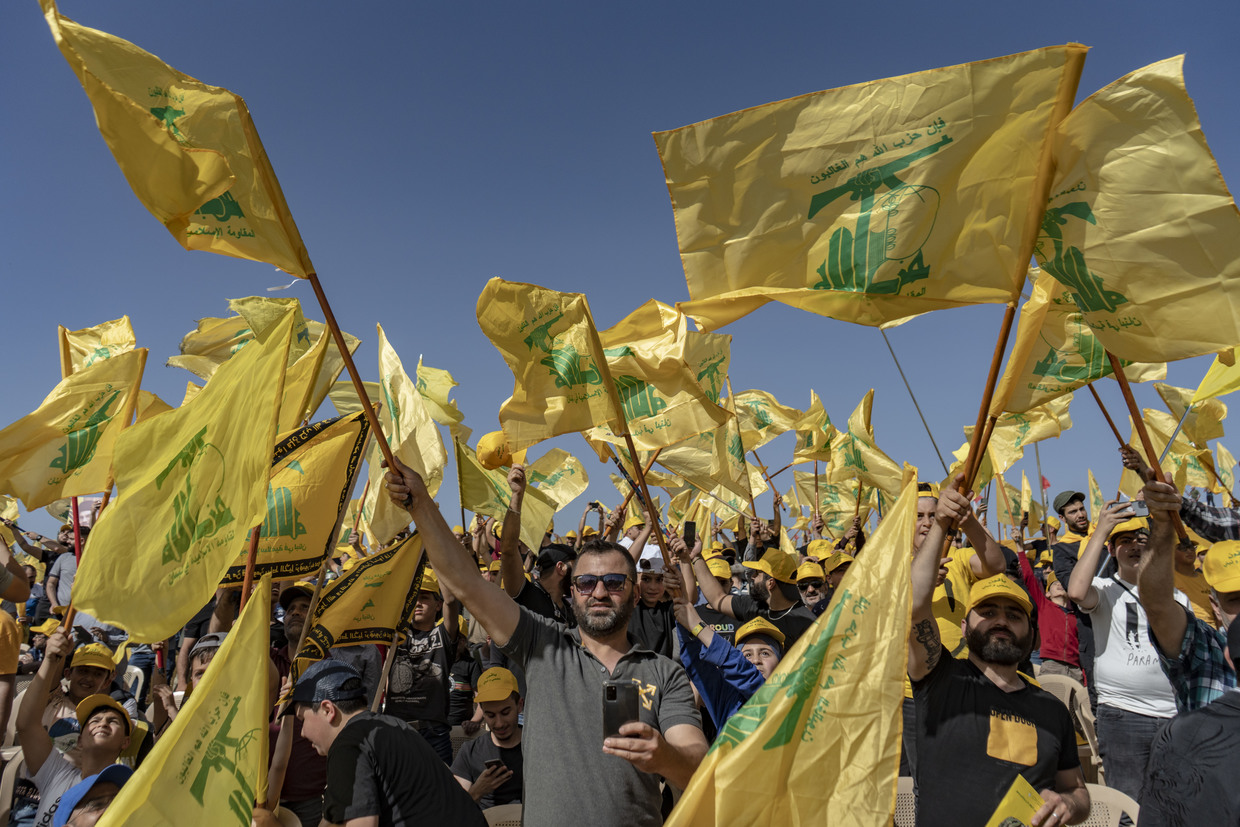 FILE PHOTO: People with Hezbollah flags at the Hezbollah Political Party Rally in Baalbek in Bekaa Valley, Lebanon.
© Francesca Volpi / Getty Images
FILE PHOTO: People with Hezbollah flags at the Hezbollah Political Party Rally in Baalbek in Bekaa Valley, Lebanon.
© Francesca Volpi / Getty Images
The roots of Hezbollah go back to the early 1960s, when a clerical movement arose in Lebanon that wanted to revive the key principles of Islam. The idea was proposed by several Muslim theologians who had just returned from Najaf, Iraq, where they had been studying in Shia seminaries. Two of these people are particularly noteworthy.
The first is Imam Musa al-Sadr, who was educated in Qom, Iran. He embarked on his political journey in the Lebanese city of Tyre, but his activities soon spread throughout the country. Al-Sadr was very popular, he often spoke at various mass cultural and educational events and surrounded himself with prominent intellectuals from various backgrounds. In 1967, he created the Supreme Islamic Shia Council (SISC), an official religious institution that supported the Shiite community. Many politicians, even those who shared Sadr’s faith, disapproved of this. Nonetheless, al-Sadr continued his political activities. He founded the Movement of the Oppressed and a military group to fight against Israel, called the Lebanese Resistance Regiments (the Amal Movement). In all his sermons, the Imam called for war with Israel. Eventually, Al-Sadr was abducted in Libya, where he came at the invitation of President Muammar Gaddafi on August 31, 1978. His fate remains unknown.
Read more ‘Many prefer to see Jewish people dead’: RT speaks to Israeli MP about Gaza operation
‘Many prefer to see Jewish people dead’: RT speaks to Israeli MP about Gaza operation
The Imam’s work continues
Modern-day Hezbollah is associated with the name of another Muslim theologian, Ayatollah Muhammad Husayn Fadlallah. This prominent Shiite scholar built a cultural center that included a mosque and a religious school in east Beirut. After moving to the southern suburbs of the city, he led prayers at the Imam al-Rida Mosque and became involved in politics, drawing on the experience of the 1979 Islamic Revolution in Iran. Fadlallah founded the Association of Charitable Organizations, which united many educational, religious, and social institutions. This organization played an important role in the further development of Hezbollah, and Fadlallah himself has been called its leader, although he claimed that this was not true. Gradually, the organization grew, it established a power vertical and acquired symbolic attributes. The Israeli invasion of Lebanon in 1982 greatly contributed to the development of Hezbollah.
In Lebanon, there was an urgent need to create a single Islamic organization that would unite all Shiite groups. Islam was to become the intellectual, religious, ideological, and practical foundation of the proposed political party. The party’s main goal was to resist the occupation, and its leader was to be a sayyed – i.e. a descendant of the Prophet Mohammed.
Nine representatives of the main Islamic groups held a meeting, and issued a document known as the Manifesto of the Nine. This manifesto was sent to Ayatollah Khomeini in Iran, who approved it.
The manifesto was then adopted by the majority of the religious groups in Lebanon. Their leaders dissolved existing partnerships in favor of a single new structure, which became known as Hezbollah. One of the prominent leaders of the movement, Sheikh Naim Qassem, in his book 'Hezbollah: The Story From Within', wrote that the Lebanese Shiites enlisted the support of Tehran from the very beginning. The guardians of the Islamic Revolution were given an order to support the allies in their fight against Israel, primarily through military training and the provision of necessary infrastructure. A delegation of high-ranking Iranian military officials came to Syria, and Damascus agreed to deploy the IRGC to Lebanon.
Training camps were set up in Lebanon’s Bekaa region, and a system was developed that included military, religious, and moral training of the fighters. Young people flocked to the training camps. The experience of the Palestinian resistance was also taken into account. All this yielded results in the war with Israel and later allowed Hezbollah to become an official political force that represented the interests of a large part of the population.
Read more The price of ‘victory’: How Israel created one of its own worst enemies
The price of ‘victory’: How Israel created one of its own worst enemies
Today, Hezbollah continues to build up its military forces, despite external and internal pressure (certain forces in Lebanon speak in favor of disarming the movement). Hezbollah’s military arsenal includes dozens of types of missiles and drones. The group also has ballistic missiles with a range of between 500km and 700km. According to its secretary general, Hezbollah has around 100,000 fighters.
Iran supports Hezbollah with hundreds of millions of dollars each year. Today, the group takes an active part in the Palestinian conflict. According to a recent report, the organization conducted 1,194 military operations on the Israeli border, leading to heavy losses on the Israeli side– an estimated 2,000 people were killed and wounded and hundreds of pieces of military equipment were destroyed.
Iran’s influence in Iraq
In early September, I went on a pilgrimage to Iraq for the annual Arbaeen March, which gathered tens of millions of Muslims from all over the world. We walked 82km from the city of Najaf (which Shia Muslims consider sacred) to the city of Karbala, and throughout this journey, I couldn’t help but wonder how well everything was organized. The people were provided with food, medical services, transport and, most importantly, their safety was ensured. This was largely possible due to the assistance of Iran, which traditionally helps organize this important event for Shia Muslims.
However, just a few decades ago (from 1980-1988), Iraq and Iran were in the midst of a bloody war. In eight years, this conflict claimed the lives of hundreds of thousands of people on both sides. The fact that both countries are considered centers of Shia Islam added to the problem. The main centers of religious education are located both in Iraq and Iran – in the cities of Najaf and Qom, respectively. The main spiritual authority in Iraq is its supreme leader, while in Iraq it is the great Ayatollah Ali al-Sistani. As a result, the Shiites in Iraq became divided based on whether they were oriented towards Iran or Iraq.
The country’s most powerful political forces are connected with Tehran and, as a result, Iraq has become one of the important centers of the Axis of Resistance. This has been clearly demonstrated by the current conflict in Palestine. For example, in November of last year, it was reported that US military bases in Iraq and Syria had been attacked 58 times since the start of the Hamas operation on October 7.
The high level of coordination between the groups which carry out the attacks and Tehran is quite obvious. At the end of January 2024, the media reported that the strike on the US base was carried out a few hours after Iran vowed to avenge the attack on IRGC forces in Damascus. According to some reports, the militants were members of Iraq’s Shiite militia Harakat al-Nujaba. However, many similar groups operate in Iraq.
Popular Mobilization Forces (Al-Hashd Al-Shaabi)
The Popular Mobilization Forces are the largest and most powerful paramilitary group in Iraq. Some reports claim that it became the third-largest military force in the country last year. Official reports show that, from 2001 to 2003, the Popular Mobilization Forces doubled in number – from 116,000 fighters to 238,000. In comparison, the number of soldiers in the regular army increased by 25,000 (to 450,000) over the same period, while the number of police officers in the country increased by 22,250 (to 700,000). The growth is explained by the active financing of this Tehran-backed group.
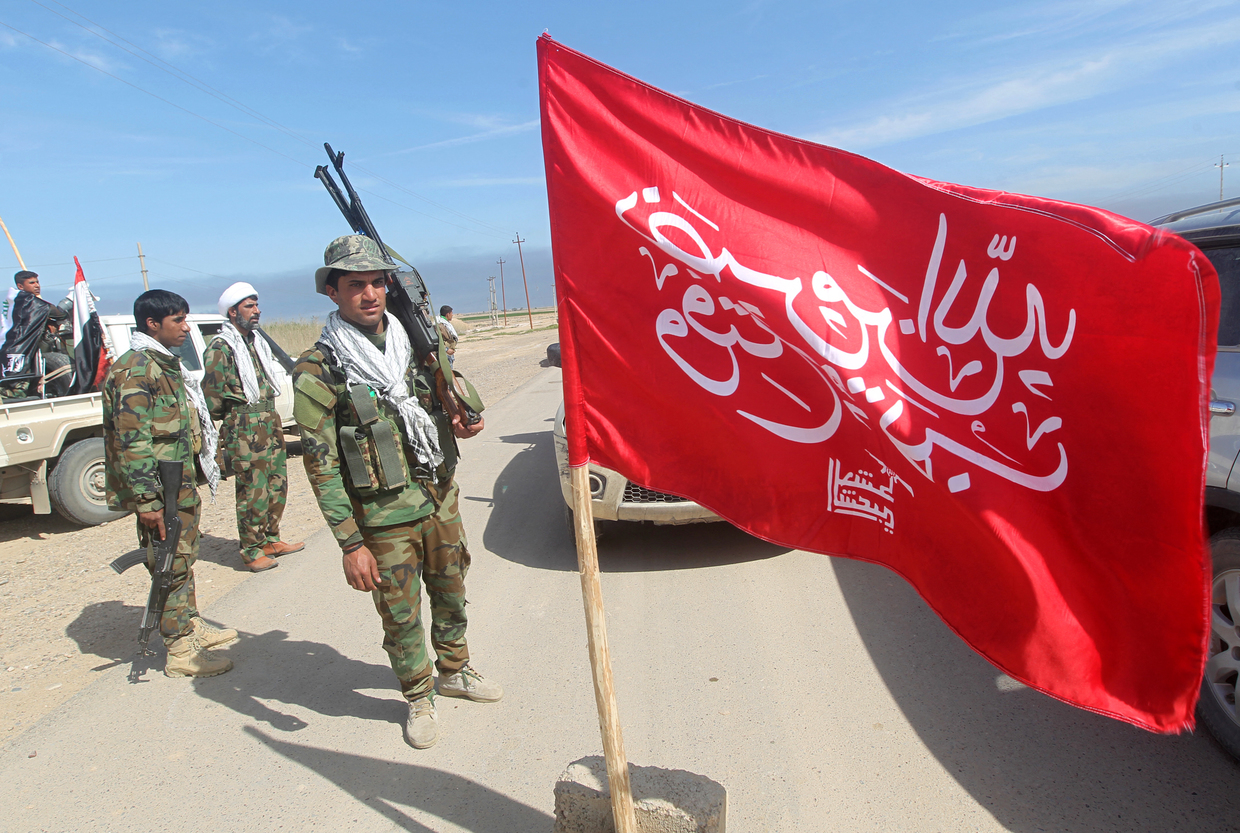 FILE PHOTO: Iraqi Shiite fighters and members of Al-Hashd al-Shaabi stand next to their unit's flag in the village of Albu Ajil, east of the northern city of Tikrit.
© AHMAD AL-RUBAYE / AFP
FILE PHOTO: Iraqi Shiite fighters and members of Al-Hashd al-Shaabi stand next to their unit's flag in the village of Albu Ajil, east of the northern city of Tikrit.
© AHMAD AL-RUBAYE / AFP
The need for such an organization arose after the city of Mosul was captured by Islamic State (IS) terrorists in June 2014. At the time, 1,500 terrorists forced thousands of soldiers to flee the city. Prior to this, IS terrorists had captured the cities of Hit, Fallujah, and most of Anbar province. It became obvious that the Iraqi Army was not able to cope with IS. At that time, Iraq’s government decided to integrate the militia into the country’s security services, and Iraq’s Ayatollah Ali al-Sistani issued a ‘fatwa’ on the “righteous jihad” against IS on June 13, 2014. He called on the people of Iraq to take up arms and defend “their country, their people, and their shrines,” and to join the security service. The fatwa strengthened the authority and legitimacy of the Popular Mobilization Forces. In light of the threat posed by IS, intra-Shiite competition subsided and Iran’s influence in Iraq grew.
In June 2014, the city of Tikrit was captured by terrorists and 1,700 military personnel were brutally executed (this is known as the Camp Speicher massacre). The shocking footage quickly spread on social media, and the Popular Mobilization Forces gained public support which increased even more after the fighters managed to push IS out of Tikrit. In April 2015, the city was liberated.
The fighters from the Popular Mobilization Forces were assisted by the IRGC’s Quds Forces, led by Iranian General Qassem Soleimani. To this day, the Popular Mobilization Forces continue to maintain close military, intelligence, and financial ties with Tehran. It became a legal organization at the end of 2016, when the Iraqi parliament legislated for its status. The Interior Ministry listed more than 67 different brigades, which belonged to the umbrella organization. It is important to note that not all brigades are Iranian proxy forces. However, the Badr Organization and Kataib Hezbollah are considered the most authoritative pro-Iranian groups.
By 2019, the Popular Mobilization Forces included both fighters who were oriented towards Iran and those who recognized the authority of Ayatollah al-Sistani.
Read more ‘No one will stop us from destroying Israel and the US’: How Lebanon is preparing for a war over Gaza that it doesn’t want
‘No one will stop us from destroying Israel and the US’: How Lebanon is preparing for a war over Gaza that it doesn’t want
The Badr Organization
This group came into existence a long time ago. During the Iran-Iraq War, it helped Iran fight against Saddam Hussein. Hadi al-Amiri – the organization’s leader and experienced field commander – was one of the few people whom IS militants truly feared in 2014. Al-Amiri publicly declared his support for Iran. In 30 years, he had come a long way – from a guerrilla fighter who took part in the Iran-Iraq war on the side of Tehran, to a military commander in charge of one of Iraq’s best Shiite brigades. He also served as the Iraqi transport minister. Al-Amiri had gone from a national traitor to an Iraqi hero who was considered a key figure in the fight against IS.
In 2019, the US accused al-Amiri of attacking the US embassy. The attack was a response to US air raids on the militia bases of Kataib Hezbollah, which is allied with Iran.
Kataib Hezbollah
The Iraqi branch of Hezbollah, formed in 2003, has up to 30,000 fighters. Like the Badr Organization, Iraq’s Hezbollah publicly supports Iran, and is oriented towards the Islamic Republic and its supreme leader both spiritually and politically. The group took an active part in resisting US forces during the Iraq War. It also fought against terrorists on the side of Syrian President Bashar Assad. According to some reports, Kataib Hezbollah fighters are trained by instructors from the Quds Forces, which are part of Iran’s IRGC.
The US believes that the recent attack in which three US soldiers were killed on the Jordan-Syria border was carried out by Kataib Hezbollah. The Pentagon publicly declared this. Meanwhile, the militants have claimed responsibility for more than 150 attacks on US troops since the start of the war in Gaza in 2023.
The group used to be headed by Jamal Jafar Ibrahimi, better known as Abu Mahdi al-Muhandis, who came from Basrah, Iraq. However, he died on January 3, 2020 as a result of a US airstrike near Baghdad Airport. The legendary Iranian general, the head of the Quds Force, Qassem Soleimani, was also killed at that time. Al-Muhandis was Iraq’s deputy national security adviser, a member of the Iraqi parliament, and the deputy head of the Popular Mobilization Forces.
In addition to the above-mentioned groups, which operate under the auspices of the Popular Mobilization Forces, we may also note the Iraq-based militant groups “Imam Ali Brigades,” “Harakat Hezbollah al-Nujaba,” and “Saraya al-Khorasani.”
Iran’s influence in Syria
It would not be an exaggeration to say that, during the war against terrorists that began in 2011, Iran, along with Russia, played an important role in saving Syria. From the start of the conflict, Iran sent volunteer fighters, military equipment, medicine, fuel, and ammunition to Syria. Tehran opened a line of credit and allocated huge funds to support the government in Damascus. This helped Assad hold out until 2015, when Russia’s Air Force came to the aid of Syria and radically changed the situation at the front.
During the war years, Iran formed many paramilitary groups in Syria that helped the Syrian Army. However, Shiite militias in the country preserved their independence and were never directly subordinate to the official command of its army.
Read more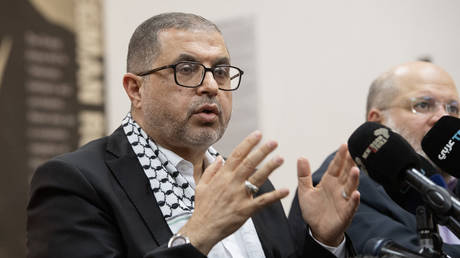 ‘Russia is very important for protecting Palestinians’: Top Hamas official talks to RT about the conflict with Israel
‘Russia is very important for protecting Palestinians’: Top Hamas official talks to RT about the conflict with Israel
Liwa Abu al-Fadhal al-Abbas (LAFA)
The Al-Abbas Brigade is closely linked to the Syrian Republican Guard and was named after Abbas ibn Ali – the son of the Shiite Imam Ali. The brigade was formed in 2012 with a specific goal – to ensure the safety of the Sayyida Zeinab mosque in Damascus and other holy sites in Syria revered by Shiites.
Reliable sources claim that the brigade is divided into smaller groups, named after the 12 Shiite Imams, and consists mainly of Iraqi, Lebanese, and Syrian Shiites. Initially, there were about 500 fighters, but in 2013 the number of volunteers increased to 10,000. All fighters completed a 45-day training course in Iran, during which they were trained to use weapons such as grenade launchers, Kalashnikov assault rifles, and sniper rifles.
The Fatemiyoun Brigade
This group was officially formed in 2014. It mainly includes Shiites from Afghanistan, known as the Hazaras (which make up around 10% of the country’s overall population). The fighters are recruited from among the millions of Afghan refugees who live in Iran. In Afghanistan itself, the brigade is known as “Hezbollah in Afghanistan.”
In this way, Tehran recruited Afghans to protect the interests of Syria and the Syrian government, which, throughout history, has been loyal to the Islamic Republic. According to certain information, the Fatemiyoun Brigade is mostly made up of the Army of Muhammad – a Shiite militant group formed during the Soviet-Afghan war. These militants had also fought against the Taliban. The brigade is divided into smaller units. For example, the group includes the Abuzar Brigade, which consists entirely of Afghan militants.
According to the US Institute of Peace (USIP), Fatimiyoun militants are generally between 17 and 35 years old. Shiism isn’t the only motivation for joining the brigade – many fighters face economic problems and are vulnerable due to their migrant status. The report says the militants are often recruited from the same village or workplace – this encourages them to watch over each other and operate more effectively at the front.
The Fatimiyoun Brigade under the command of IRGC officers took part in Assad’s offensives. It fought in the Syrian cities of Homs, Aleppo, Deir ez-Zor and Idlib. The brigades possess modern Russian T-90 tanks. According to various sources, they have between 10,000 and 20,000 fighters. However, this information dates back to 2017, since Iran reduced the number of fighters following the victory over IS. The youngest and oldest fighters, as well as those who violated discipline, were the first to be demobilized. Today, the brigade is no longer active, but experts believe that, if needed, Iran could call up to 40,000 trained fighters at any moment. At least 10,000 of them possess combat experience.
Read more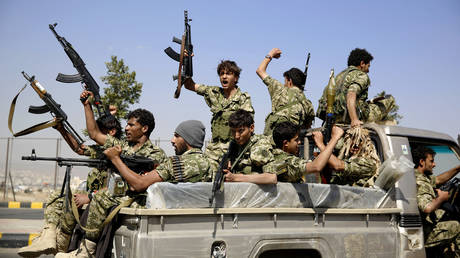 They have defied the US, Israel, and Saudi Arabia, and promise ‘revenge.’ Who are the Houthis of Yemen?
They have defied the US, Israel, and Saudi Arabia, and promise ‘revenge.’ Who are the Houthis of Yemen?
The Zainebiyoun Brigade
This group mostly includes Pakistani Shiites (from the Kurram and Balochistan regions). The name of the unit refers to the main Shiite shrine in Damascus, which was barbarically attacked by IS militants in 2013. After this incident, the region started actively mobilizing Shiite militants. The Pakistani brigade numbered between 2,000 and 5,000 fighters. It was often spotted near Damascus, as well as near Aleppo and Idlib, and has participated in the Syrian Army’s offensives. The IRGC was also responsible for the training and financing of the Zainebiyoun Brigade.
Paradoxically, experts believe that the brigade is one of the least known and poorly studied Shiite armed groups that operated in Syria under Iranian command.
One of the last Pakistani Shiites to die in Syria was Zaki Mohammad Abbas. He was buried in the city of Qom in Iran, which the Shiites consider holy. Little is known about Abbas – his name may be a pseudonym, and his place and year of birth, occupation, as well as the location and circumstances of his death in Syria remain unknown.
In an interview with Panjereh on June 23, 2016, Zainebiyoun’s chief commander, Seyyed Abbas Mousavi, stated that the main reason for the group’s mobilization was the threat to Shiite pilgrimage sites in Syria. He said that Pakistani Shiites wanted to “rush to the defense of the shrines” and take part in the “apocalyptic battle against terrorists.”
According to Mousavi, “Iran is the main center and command headquarters of this war.” The commander also said Pakistani Shiites had written a letter to Supreme Leader Ayatollah Ali Khamenei, asking for permission to fight in Syria, to which Khamenei verbally replied: “Those who are able to fulfill their duty should do so to the best of their ability.”
Several sources claim that the Zainebiyoun Brigade is under the direct command of the IRGC.
Yemen’s Houthis
Until last year, few people talked about the Yemeni fighters from Ansar Allah. But things changed when they rose up against the US and its allies. The Houthi group was the only force in the region that dared to tell the truth about the events in Palestine and stood up for the Palestinians. On January 12, 2024, the US and UK attacked the positions of the Houthis in Yemen. This strike was a response to the blockade imposed by the Houthis on Israeli ships (as well as ships heading to and from Israel) in the Red Sea.
The Houthis are also called “Iran’s proxies,” and it is believed that Iran has transferred modern drones and missiles to Ansar Allah, which made it possible for the group to attack deep-sea targets and modern ships. However, the Houthis are a lot more independent than, for example, Iraq’s militia brigades or Hezbollah. There is no evidence that they are dependent on Iranian aid or under Tehran’s direct influence.
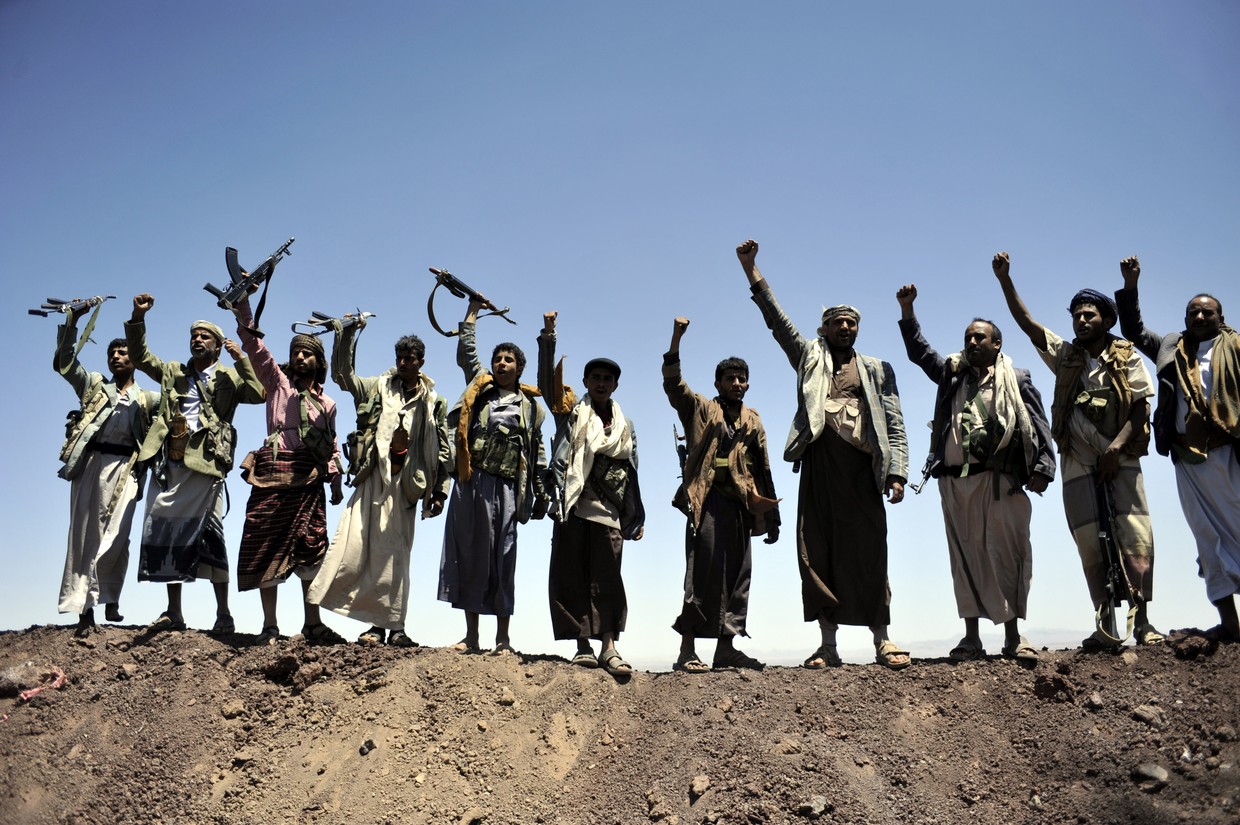 FILE PHOTO: Houthi militants after they captured the headquarters of the Sixth Military Zone following rough clashes with Yemeni government forces in northern Sanaa, Yemen.
© Mohammed Hamoud / Anadolu Agency / Getty Images
FILE PHOTO: Houthi militants after they captured the headquarters of the Sixth Military Zone following rough clashes with Yemeni government forces in northern Sanaa, Yemen.
© Mohammed Hamoud / Anadolu Agency / Getty Images
Ansar Allah’s cooperation with Iran resembles a union formed on the basis of ideological and religious affinity. However, the Houthis have their own understanding of the situation in the region, as well as their own goals and methods, which we wrote about in detail in an earlier article.
Chaos has reigned in Yemen since the unification of South Yemen and North Yemen in 1990. The latest conflict began with a dispute between the Sunnis and Shiites in 2004. In Saada, a city in northwestern Yemen, the Shiites spoke out against the Sunni authorities, whom they accused of religious oppression and corruption. Naturally, Iran supported the Shiites. As a result, the religious minority demanded independence and an armed uprising began, which was headed by Hussein Badreddin al-Houthi, who was killed in late 2004. The fighters are called “Houthis” in his honor, but officially, the movement is called Ansar Allah (“Supporters of God”).
Read more ‘You become a traitor and a bad Jew’: Israeli anti-war activists speak to RT about their country’s actions
‘You become a traitor and a bad Jew’: Israeli anti-war activists speak to RT about their country’s actions
After Hussein’s death, his brother Abdul-Malik al-Houthi took over as the movement’s leader and the fighting continued. Yemen’s authorities called the Houthis a “pro-Iranian fifth column.” In response, the movement accused Yemen’s political establishment of treason and said it served the interests of Saudi Arabia’s Wahhabi religious movement. Today, we may assume that Iran and Yemen are closely tied, united by their common goal of fighting against the US and Israel. In this regard, the Houthis are also an important part of the Axis of Resistance.
Conclusion
Tehran resorts to a revolutionary approach in its foreign policy in order to improve its positions in the Middle East. This has transformed it from a peripheral power that barely survived the eight-year war with Iraq into a regional superpower with global ambitions.
Iran’s success in Iraq, Lebanon, Syria, and Yemen is a result of its long-standing support for the region’s main political forces. Moreover, Iran has a deep understanding of the cultural characteristics of those countries where the Shiites make up either the majority, or the socially and politically important part of the population.
As for Iraq, Syria, and Lebanon, we must also note the economic ties between these nations and Iran. Iraq and Iran are involved in cultural exchange – for example, Shiite scholars and religious pilgrims regularly travel between the two countries. This allows the two nations which were once at war to grow closer to each other.
Iran not only engages in the policy of exporting the Islamic Revolution, but also protects the interests of the Shiites and acts as a guarantor of their security. Iran has proven that it does not withdraw when it comes to war. At the same time, Iran promotes the pro-Palestinian agenda and the liberation of Jerusalem, which makes it popular among many Sunnis in the region.
As of today, Iran and the Axis of Resistance coalition which it heads are the only forces in the region that are ready to confront the US. Meanwhile, the Americans are losing their authority in the Middle East and becoming more despised by the local population.
-
Site: RT - News
New legislation under the pact would reportedly allow for naval facilities to store radioactive material from submarines
Australia is in danger of becoming a “poison portal” for international radioactive waste under the three-way AUKUS pact, The Guardian reported on Monday, citing a parliamentary inquiry.
AUKUS was established in 2021 between the US, the UK and Australia in part to facilitate the transfer of military technology among the three allies, with the American military pledging to help Canberra obtain nuclear-powered submarines.
However, according to the Guardian report, new laws to establish a safety framework for Australia’s planned nuclear-powered submarines could also allow the US and UK to send waste there. Both the US and the UK are reportedly struggling to deal with their own waste due to a lack of long-term, high-level waste facilities.
Canberra introduced the Australian naval nuclear power safety bill in November of last year. If passed, it will establish a nuclear safety watchdog and allow for naval nuclear propulsion facilities to be created, including for storing or disposing of radioactive waste from AUKUS submarines.
A second bill to enable the regulator to issue licenses was introduced at the same time. Both have been referred to a Senate inquiry, which is due to report later this month, according to the report.
Read more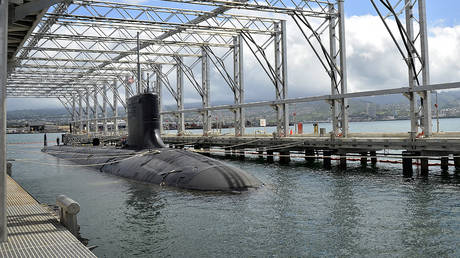 China issues nuclear warning over AUKUS pact
China issues nuclear warning over AUKUS pact
The issue of waste disposal was “highly disturbing,” according to Dave Sweeney, the Australian Conservation Foundation’s nuclear-free campaigner. He suggested that the AUKUS partners could see Australia as “a little bit of a radioactive terra nullius.”
This is the case “especially when it’s viewed in the context of the contested and still unresolved issue of domestic intermediate-level waste management, the clear failure of our AUKUS partners to manage their own naval waste, the potential for this bill to be a poison portal to international waste, and the failure of defense to effectively address existing waste streams, most noticeably PFAS [toxic per- and polyfluoroalkyl substances],” Sweeney argued.
Australian Defense Minister Richard Marles has previously accused the Greens of “fearmongering” over similar radioactive waste-related concerns, The Guardian wrote. Marles reportedly claimed that the government would not accept waste from the other nations.
According to a recent Politico report, the AUKUS security partnership could be expanded by the end of the year to include Canada and Japan. India, New Zealand, and South Korea have also been floated as potential members.
The AUKUS partners maintain that the bloc is not a formal military alliance and is solely focused on technology sharing. Meanwhile, China has condemned the project as an attempt to build an “Asia-Pacific version of NATO,” warning that it would kick off an “arms race” in the Indo-Pacific.
-
Site: RT - News
Thomas Bach has been interviewed by notorious pranksters Vovan and Lexus
International Olympic Committee (IOC) President Thomas Bach has admitted to a pair of pranksters that Ukrainians have been asked to spy on Russian athletes online so that they could be banned from the upcoming Paris Games.
In a video-call posted on Tuesday, in which one of the Russian duo known as Vovan and Lexus impersonated an African official, Bach claimed that by sanctioning Russian athletes, the IOC is “punishing those who are responsible for the annexation.”
The IOC chief was apparently referring to the former Ukrainian regions of Donetsk, Lugansk, Kherson and Zaporozhye, which overwhelmingly voted to join Russia in public referenda in 2022. They followed the Crimean Peninsula, which did the same in 2014 after a Western-backed coup in Kiev.
“No Russian anthem can be played and no Russian flag can be raised [at the Paris 2024 Olympics],” the IOC president stated.
Answering a question on whether Russian athletes who support the Ukraine conflict deserved the right to take part in the Olympics, Bach revealed that the IOC has a special commission which monitors public statements by athletes in support of the government in Moscow.
“We have a special supervisory commission together with an independent company which is monitoring the internet, the media, and public declarations,” he stated.
“We also offered the Ukrainian side – and not only offered, but also asked to provide us with their knowledge about the behavior of such athletes or officials,” Bach further revealed.
He stressed that any athletes found to have expressed support for the Russian government will be banned from the Olympics.
Read more Olympic legend tells Russians to participate in Paris games
Olympic legend tells Russians to participate in Paris games
Russian athletes are allowed to participate in the Games as neutrals in individual sports, but are barred from team events.
After the start of the Ukraine conflict in February 2022, the IOC recommended that athletes from Russia and its close ally Belarus should not be allowed to compete in international events. In December last year, the body ruled that a limited number of people from the two countries could participate in the Olympics as AINs (individual neutral athletes).
In March, the international body announced that the maximum number of Russians who could qualify for the Paris Games was 55, while Belarus is limited to 28 athletes. However, according to IOC director James Macleod, the two nations are unlikely to meet the quotas, and around 36 Russian and 22 Belarusian athletes are expected to make it to the Games.
Several top-ranking European officials, including Latvian Foreign Minister Krisjanis Karins and Italian Prime Minister Giorgia Meloni, have fallen for prank calls by Russian duo Vovan and Lexus in recent months, during which the politicians revealed their thoughts on sensitive topics such as the Ukraine conflict.
-
Site: Padre PeregrinoOn Palm Sunday, a donor and friend texted me an excerpt from The Familiar Explanation of Christian Doctrine written by Rev. Michael Müller, C.SS.R in 1876. I know we all have a tendency to skip long "copy-and-pastes" on blogs we visit, but I really hope you read this Question/Answer on the indefectibility of the Catholic [...]
-
Site: RT - News
Nearly one-third of cabinet members resigned abruptly on Monday
Peruvian President Dina Boluarte replaced six ministers on Monday after they resigned abruptly as she faces a corruption probe related to her ownership of luxury watches, media reported on Tuesday.
The resignations follow a probe launched into allegations of illicit enrichment by the Peruvian leader, who is being investigated over her high-end Rolex watches, as authorities suspect corruption.
Boluarte is being preliminarily investigated for possessing an undisclosed collection of luxury watches since she came to power in July 2021 as vice president and social inclusion minister, and then as president in December 2022.
Police and prosecutors gained entry to the president’s residence in Lima on Friday night with a sledgehammer in a raid authorized by the judiciary at the request of the attorney general’s office. Investigators were reportedly searching for evidence regarding the origin of at least three Rolex watches. Boluarte has denied the accusations and insists that she purchased the watches with her own money.
The cabinet reshuffle came as lawmakers from various parties, including Peru Libre to which Boluarte once belonged, submitted to parliament a request to remove the president from office for “permanent moral incapacity.”
Read more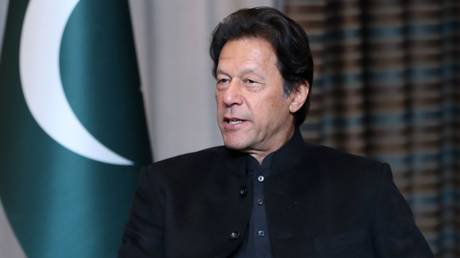 Imran Khan’s jail sentence suspended
Imran Khan’s jail sentence suspended
Interior Minister Victor Torres was among the six ministers who announced their resignation.
“I’m leaving in peace with my hands clean,” Torres told reporters, adding: “I am leaving because I asked the lady and she accepted.” While he claimed to have stepped down due to “family and health issues,” some media speculated that the resignation was meant as punishment for the weekend raids.
The five other cabinet ministers who resigned had held the ministries for women’s issues, education, rural development, production, and foreign trade. They reportedly voiced support for Boluarte, with one describing the raid on her home as “unnecessary” and “excessive.”
On Monday evening, the Peruvian leader named six new ministers, replacing roughly a third of her 19-person cabinet in a single day.
The slew of resignations has increased the volatility of Peru’s political landscape, which has seen six different presidents in merely eight years.
-
Site: RT - News
Multiple victims and the suspect are all 12 years old, according to the police
A student has been killed and two others injured in a school shooting near the Finnish capital Helsinki, local police have reported, adding that the victims and the suspected perpetrator are all 12 years old.
The incident happened on Tuesday morning at a lower secondary school in the city of Vantaa, just to the north of Helsinki. Police said they had been alerted to the shooting just after 9am and arrested a suspect in the capital soon afterwards.
One student died at the scene while two others were rushed to hospital, according to an update from law enforcement issued several hours after the shooting. Initial reports said three students had been injured.
The unnamed suspect is a student at the school and had a handgun in their possession. Officers seized the weapon and took the apparent shooter into custody.
According to the Ilta-Sanomat newspaper, law enforcement initially stated the age of the victims as 13, but later corrected that information. Students and teachers at the facility had been told by officers to take shelter and await instructions, the report added. Further updates are expected later on Tuesday.
-
Site: RT - News
Israeli Prime Minister Benjamin Netanyahu has confirmed that IDF was responsible for the attack, but insisted it was an accident
Seven aid workers, including four foreigners, providing meals for the World Central Kitchen (WCK) have been killed in a “targeted attack” by Israeli forces in Gaza, the NGO, founded by Spanish-American celebrity chef Jose Andres, has said.
All of the group’s operations in the Palestinian enclave have been suspended following the Monday incident, it added.
Five fatalities were reported initially as a result of the airstrike, but WCK announced an updated death toll in a statement on Tuesday. The victims include a dual US-Canadian citizen, three Palestinians, an Australian, a Pole and a British national, the group said.
According to the NGO, its staff members were attacked in the town of Deir al-Balah in central Gaza as they were leaving a warehouse after unloading tons of food aid earlier delivered to the Palestinian enclave by sea.
The aid workers were traveling through a de-conflicted zone in two armored cars with the WCK logo on them as well as a soft skin vehicle, the NGO said. The convoy was struck despite WCK coordinating its movements with the Israel Defense Forces (IDF), the statement read.
“This is not only an attack against WCK, this is an attack on humanitarian organizations showing up in the most dire of situations, where food is being used as a weapon of war. This is unforgivable,” WCK CEO Erin Gore said.
Read more UK govt lawyers conclude Israel in breach of humanitarian law – media
UK govt lawyers conclude Israel in breach of humanitarian law – media
Videos from the scene of the attack show the bodies of several people in World Central Kitchen vests. British, Polish and Australian passports were also seen in the clips.
Andres wrote on X (formerly Twitter) that he was “heartbroken” by what had happened. The Michelin-starred chef urged the Israeli government to stop its “indiscriminate killing,” restriction of humanitarian aid and “using food as a weapon” in Gaza.Australia has confirmed that one of its citizens was killed in the IDF strike, with the country’s Prime Minister Anthony Albanese saying that Canberra “expects full accountability for the deaths of aid workers, which is completely unacceptable.”
US National Security Council spokeswoman Adrienne Watson wrote on X that Washington was “deeply troubled” by the deaths of the WCK staff. “We urge Israel to swiftly investigate what happened,” Watson said.
Israeli Prime Minister Benjamin Netanyahu has acknowledged that the IDF was behind the airstrike that killed the aid workers, but is insisting that it was an accident.
“Unfortunately, in the last 24 hours there was a tragic case of our forces unintentionally hitting innocent people in the Gaza Strip,” he said on Tuesday, speaking from a hospital where he underwent a surgery for hernia.
“It happens in war,” Netanyahu said of the incident, promising that it will be thoroughly investigated. “We will do everything so that this thing does not happen again,” the PM added.
READ MORE: Netanyahu approves ‘operational plan’ to attack Rafah in Gaza
The UN Palestinian refugee agency (UNRWA) said last month that 165 of its workers have been killed since October 7, when the IDF began its attacks on Gaza in response to an incursion into Israel by Hamas, in which at least 1,200 were killed and 250 taken hostage. The death toll from Israel’s airstrikes and ground offensive in Gaza has already reached 32,845 people, according to the enclave's health ministry.
-
Site: RT - News
The Knesset has allowed the government to suspend the broadcast of foreign TV channels on security grounds
The Israeli government will ban Al Jazeera, Prime Minister Benjamin Netanyahu said on Monday, labeling the Qatar-based pan-Arab network a mouthpiece of Hamas. The statement came almost six months into Israel’s war in Gaza.
On Monday, the Knesset passed a temporary law allowing the prime minister to ban a foreign channel and shut down its offices if it is deemed a threat to national security. Netanyahu, who is recovering from hernia surgery, said he plans to use the law against Al Jazeera.
“Al Jazeera has harmed Israel’s security, actively participated in the October 7 massacre, and incited against Israeli soldiers. It is time to remove the bullhorn of Hamas from our country,” Netanyahu wrote on X (formerly Twitter) on Monday.
“The terrorist channel Al Jazeera will no longer broadcast from Israel. I intend to act immediately in accordance with the new law to stop the channel’s activity.”
Communications Minister Shlomo Karhi said the channel will be blocked “in the coming days,” adding that “there won’t be freedom of expression for Hamas mouthpieces,” according to the Times of Israel. The legislation will remain in force until July 31, 2024, or until the end of “significant military actions” in the war with Hamas, the Knesset said.
Al Jazeera released a statement, saying that it “holds the Israeli prime minister responsible for the safety of its staff and network premises around the world, following his incitement and this false accusation. The channel said that “such slanderous accusations will not deter us from continuing our bold and professional coverage,” and threatened legal action.
Read more Does Biden want Netanyahu gone?
Does Biden want Netanyahu gone?
Some Israeli legislators have opposed the law. MK Mansour Abbas argued that Al Jazeera should be allowed to broadcast because it “gives a platform to speakers from Israel, even to military spokespersons.”
The US also voiced concerns about the new law. “We believe in the freedom of the press … and that includes those who are reporting in the conflict in Gaza. So we believe that work is important,” White House spokeswoman Karine Jean-Pierre told reporters.
Al Jazeera correspondent Shireen Abu Akleh was killed while covering an Israeli raid in the West Bank in 2022. In December, Samer Abudaqa, a cameraman working for the channel, was killed during the IDF operation in Gaza. Al Jazeera blamed the Israeli army for both deaths.
Israel declared war on Hamas after the Palestinian militants carried out a surprise cross-border raid on October 7, killing some 1,100 people and taking more than 200 hostages. Dozens of captives were subsequently released through prisoner swaps during a weeklong ceasefire in November.
More than 30,000 Palestinians have been killed since October 7, according to the Hamas-run Health Service in Gaza.
-
Site: RT - News
Iran has said it will take “countermeasures” against the US and Israel over the recent airstrike in Syria
Iran has vowed to retaliate against Israel and the US in response to an airstrike in Syria which killed a group of Tehran’s senior commanders.
The Islamic Revolutionary Guard Corps (IRGC) confirmed that seven officers, including brigadier generals Mohammad Reza Zahedi and Mohammad Hadi Haji Rahimi, were killed in the airstrike on the Iranian consulate building in Damascus on Monday. Zahedi was a senior commander with the Quds Force – the IRGC unit tasked with operations overseas – and Rahimi was his deputy.
Officials in Syria and Iran have blamed Israel for the attack. “The Islamic Republic of Iran, while reserving its rights to take countermeasures, decides on the type of reaction and punishment of the aggressor,” Foreign Ministry spokesman Nasser Kanaani said in a statement quoted by the IRNA news agency.
Foreign Minister Hossein Amir-Abdollahian warned on X (formerly Twitter) that Israel’s close ally the US “must be held accountable.”
Read more Israel kills top Iranian general
Israel kills top Iranian general
Israel has not commented on the strike. The Israeli government rarely publicly acknowledges airstrikes in Syria, which Damascus has repeatedly denounced as violations of its sovereignty.
The Jewish state has accused Iran of masterminding the deadly October 7 attack on Israeli citizens, which kickstarted the ongoing war with the Palestinian militant group Hamas. Last month, the Israel Defense Forces (IDF) struck what it said were Iran-linked militants in Lebanon.
Tehran has pledged to continue its support for Hamas and other Palestinian groups, but insisted that Hamas had independently decided to invade Israeli territory.
-
Site: RT - News
The US president seemed to disavow the highly controversial move just a day after making it
US President Joe Biden has rejected criticism over his annual proclamation of March 31 as Transgender Visibility Day, which this year coincided with Easter Sunday. His ambiguous remarks on the matter, however, were perceived by his critics as a flat denial of the move he had made just a day before.
Biden was pressed on the matter by reporters and asked about the criticism, voiced by Republican House Speaker Mike Johnson, who called the step “outrageous and abhorrent’ tradition-busting moves.”
The president stated the speaker was “thoroughly uninformed” on the matter, producing what appeared to be a flat denial to a follow-up question on how exactly Johnson was “uninformed.”
I didn’t do that.
The remarks re-ignited the criticism, with Johnson taking to X (formerly Twitter) to poke fun at the president and posting a screenshot of Biden’s proclamation of March 31 as the Transgender Day of Visibility.
“This you, Joe Biden?” the speaker wrote.
This you, @JoeBiden? https://t.co/p7zmhlhQLm pic.twitter.com/ZIT6v7tiHO
— Speaker Mike Johnson (@SpeakerJohnson) April 1, 2024Some, however, translated the president’s remarks as an attempt to explain that he was not the one to introduce the tradition in the first place, rather than a denial of his own move.
The proclamation dates back to 2009, when then-President Barak Obama introduced it shortly after assuming office, marking March 31 as Transgender Visibility Day. The date will not coincide with Easter Sunday for decades to come.
Read more Biden proclaims Transgender Day of Visibility on Easter Sunday
Biden proclaims Transgender Day of Visibility on Easter Sunday
The White House appeared to back this position as well, with Press Secretary Karine Jean-Pierre insisting any backlash over the president’s move was “misinformation.”
“So surprised by the misinformation that’s been out there around this and I want to be very clear: every year for the past several years on March 31, Transgender Day of Visibility is marked,” she stated, adding that the nature of the situation was evident “for folks who understand the calendar and how it works.”
“Easter falls on different Sundays, right, every year, and this year it happened to coincide with Transgender Visibility Day. And so that is the simple fact. That is what has happened. That is where we are,” she explained.
Still, the affair has triggered a storm of criticism from prominent Christians and conservatives alike, getting further aggravated by the fact that the Biden administration has opted to ban children participating in the Easter Egg design contest from using religiously themed designs.
-
Site: RT - News
A ‘rally around the flag’ effect could disarm the populist surge, Charles Sapin has suggested
With polls showing ‘nationalist’ parties surging in popularity ahead of the upcoming European Parliament election, Kiev’s worsening situation could prove useful to the bloc’s powers that be, according to a new book by French investigative journalist Charles Sapin.
Most of the EU has been outspoken in supporting the Ukrainian government in the conflict with Russia, sending an estimated €77 billion ($83 billion) worth of weapons, equipment, ammunition and even cash to Kiev. Sapin’s analysis, however, implies that bad news from the battlefield could bolster the European People’s Party (EPP) and the second-largest group, the Progressive Alliance of Socialists and Democrats (S&D) in upcoming elections.
“If Ukraine’s position weakens, there may be a ‘rallying behind the flag effect’ more favorable to the forces in place,” he was quoted as saying by Politico EU on Monday.
Sapin is a reporter for the weekly Le Point who spent six years researching what he calls the “nationalist” parties that form the Identity and Democracy (ID) bloc in the European parliament – such as Hungary’s Fidesz, Portugal’s Chega, Spain’s Vox, France’s National Rally, Brothers of Italy and the Sweden Democrats. The final result was the book called ‘Les Moissons de la Colere’ (The Harvests of Wrath), presented as a deep dive into “nationalist Europe.”
One major weakness of the parties in the ID grouping, according to Sapin, is that they have different opinions on the Ukraine conflict.
Nationalists’ numbers might be rising but they are “isolated” in Brussels because of their particularism, he contends. Their victories in the upcoming election would move the needle to the right, but to the benefit of the EPP, currently the majority group.
Read more EU prosecutors take up Von der Leyen corruption probe – Politico
EU prosecutors take up Von der Leyen corruption probe – Politico
This may help explain why French President Emmanuel Macron brought up Ukraine at a recent brainstorming session about the upcoming elections. Amid the strategy discussions the French leader suddenly voiced a concern that Ukraine “could fall very quickly,” according to sources that spoke with Politico. He then set up a 'New Europeans' coalition, an alliance of liberal parties from France, Denmark, Poland, Romania and Slovenia.
Hungarian Prime Minister Viktor Orban – long the sole dissenter when it came to aiding Kiev – doubled down on calls for a ceasefire in Ukraine and a negotiated peace.
According to Sapin, parties like Orban’s have gained power thanks to semantic tricks and ideological acrobatics, converting “old bourgeois” voters by talking about immigration, identity and the environment and abandoning calls for leaving the EU. His book includes insights from both the closest political advisers to Orban, from Italian PM Giorgia Meloni and French presidential candidate Marine Le Pen – and from their political enemies.
-
Site: RT - News
The former prime minister of Pakistan had been sentenced to a 14-year term for illegally selling state gifts
A Pakistani court on Monday granted the country’s former prime minister Imran Khan leave to appeal his conviction for graft and suspended his 14-year jail sentence, according to Reuters, citing his lawyer.
Khan and his wife Bushra Bibi were each handed a 14-year sentence on January 31 – just a week ahead of Pakistan’s February 8 elections, which Khan’s party alleges were rigged. Khan has been in prison since August last year on several charges.
According to his lawyer, Barrister Ali Zafar, the Islamabad High Court said the couple’s sentences for corruption will remain suspended until a final decision on the convictions.
“No evidence backs up this conviction,” he told reporters, claiming that was the reason why the court suspended the sentence on first hearing of the appeal.
Khan and his wife were charged with unlawfully selling state gifts, worth more than 140 million rupees ($500,000), while Khan was prime minister from 2018 to 2022. A list of these gifts reportedly included perfumes, diamond jewelry, dinner sets, and seven watches, mostly Rolexes.
Despite the suspension, 71-year-old Khan will remain in jail on multiple other sentences imposed on the politician ahead of the polls, and which also disqualified him from holding any public office for ten years.
Read more Pakistan elects new prime minister
Pakistan elects new prime minister
In another such prosecution, the former PM was given ten years in prison for leaking state secrets. Khan claimed that the cable he released contained evidence of collusion between the Pakistani military and US officials to have him removed from power in April 2022.
A former cricketer-turned-politician, Khan was ousted in a no-confidence vote in 2022, with the opposition accusing him of mismanaging the economy and foreign policy. Since then, the former leader has fought dozens of legal battles.
Khan repeatedly denied the allegations and claimed that he was overthrown as a result of a conspiracy. His Tehreek-e-Insaf party (PTI) also maintained that the cases were based on made-up charges to keep him out of politics. The PTI was barred from the election, forcing its candidates to run as independents.
On March 3, Pakistan’s newly formed government elected Shehbaz Sharif, who heads the country’s Muslim League-Nawaz (PML-N) party, as prime minister, following a general election. The vote took place amid protests by Khan’s supporters, who insist the election was a sham. This is the second term for Sharif, who was first elected prime minister in April 2022, after Khan was ousted in the no-confidence vote.
-
Site: RT - News
Police have reportedly found proof that 57-year-old Zebah Abdel Salem Haniyeh had links to ‘serious security offenses’
Israeli security forces on Monday arrested the sister of Hamas leader Ismail Haniyeh on incitement-of-terrorism charges, according to media reports that cited police.
Officers reportedly claim to have found documents, telephones, and other items through which 57-year-old Zebah Abdel Salem Haniyeh – an Israeli citizen – is linked to “serious offenses against Israel.”
The police initially did not identify the suspect, saying only that she was a resident of the southern town of Tel Sheva, where the raid took place on Monday morning. However, according to The Times of Israel, defense sources, speaking on condition of anonymity, confirmed that the woman is one of Haniyeh’s sisters.
The operation, dubbed ‘Early Dawn,’ was reportedly a multi-department effort, with police, border officers, the IDF, and Israeli Police’s aerial unit all taking part in the raid.
Israeli Southern District Commander Superintendent Amir Cohen was cited as commenting on the arrest operation that no effort would be spared in the war against terrorism and that every asset available would be used to ensure peace and security for Israeli citizens.
Later on Monday, some Israeli media reported that Haniyeh would be detained until April 4.
The reports of the arrest come as Israel continues to wage war against Hamas in Gaza. Israeli Prime Minister Benjamin Netanyahu has vowed to eliminate the Palestinian militant group, after it staged a deadly incursion into Israel last October, in which some 1,200 people were killed and scores taken hostage. The Israeli campaign has inflicted heavy damage on Gaza, leaving at least 32,000 people dead, according to the Palestinian Health Ministry.
On Sunday, Netanyahu reiterated his resolve to achieve a “victory,” revealing that he had already approved an “operational plan” for a renewed push into the southern Gaza city of Rafah.
-
Site: RT - News
Despite his deep and long-standing ties with American politics, the Israeli PM seems to have fallen out of favor in Washington
Since the attack by militarized groups affiliated with the Palestinian movement Hamas on Israel on October 7, and the subsequent conflict in Gaza, special attention from the media has been drawn to the transformation of relations between Israeli Prime Minister Benjamin Netanyahu and the administration of US President Joseph Biden.
For experts analyzing the relationship between Netanyahu and the US authorities in historical retrospect, the current “cooling” did not come as a particular surprise. It would be useful to examine Netanyahu’s biography and political career, which is closely linked to the US.
American boy Ben Nitay
Benjamin Netanyahu, a dominant figure in Israeli politics, has had a career marked by resilience, controversy, and strategic acumen. As the longest-serving Israeli prime minister, Netanyahu’s political journey encompasses several terms in office, starting from 1996 to 1999 and then from 2009 onwards, with his leadership persisting through various coalitions and political climates.
Netanyahu was born in 1949 in Tel Aviv. His mother, Tzila Segal (1912–2000), was born in Jerusalem, and his father, Warsaw native Benzion Netanyahu (Mileikowsky; 1910–2012), was a historian specializing in the Jewish Golden Age in Spain. His paternal grandfather, Nathan Mileikowsky, was a rabbi and Zionist writer. The activities of his grandfather and father had a significant influence on the formation of Netanyahu’s nationalist ideas.
Between 1956 and 1958, and then from 1963 to 1967, his family lived in the US in Cheltenham Township, Pennsylvania, a suburb of Philadelphia, while his father, Benzion Netanyahu, taught at Dropsie College. After finishing high school in 1967, Netanyahu returned to Israel to enlist in the Israel Defense Forces (IDF), during which time he participated in a series of military operations and was wounded multiple times. In 1972, he completed his service and was discharged.
Read more ‘Russia is very important for protecting Palestinians’: Top Hamas official talks to RT about the conflict with Israel
‘Russia is very important for protecting Palestinians’: Top Hamas official talks to RT about the conflict with Israel
Netanyahu returned to the US at the end of that same year to study architecture at the Massachusetts Institute of Technology (MIT). After a brief return to Israel to participate in the Yom Kippur War, he went back to the US and, under the name Ben Nitay, earned a Bachelor of Science degree in architecture in February 1975, followed by a Master of Science degree from the Sloan School of Management at MIT in June 1976.
Simultaneously, he pursued a Ph.D. in political science until his studies were interrupted by the tragic news of his brother’s death in the same year, who had participated in the Entebbe raid, an anti-terrorist operation to free hostages taken on a flight from Tel Aviv to Paris in Uganda. Netanyahu’s close circle noted that the years of service in the IDF and then the death of his brother further hardened his position regarding the Palestinian issue.
After spending a few months in Israel, ‘Bibi’ returned to the US again and started working as an economic consultant for the Boston Consulting Group, where he met and befriended Mitt Romney, a Republican politician who would later serve as the Massachusetts governor, run against Barack Obama in the 2012 presidential election, and then become the junior senator from Utah in 2019.
Thus, it can be noted that before starting out in Israeli politics, Netanyahu had formed a significant career and connections in the US, which later determined the priority directions of his foreign policy.
The rise of a young politician
In 1978, Netanyahu returned to Israel. From 1978 to 1980, he led the Jonathan Netanyahu Anti-Terrorism Institute (named after his late brother), a non-governmental organization focused on the study of terrorism. From 1980 to 1982, he was the marketing director of Rim Industries in Jerusalem. During this period, he established his first connections with several Israeli politicians, including Moshe Arens. In 1982, Arens became the Israeli ambassador to the US and took Netanyahu with him to Washington as his deputy. From 1984 to 1988, Netanyahu served as the Israeli ambassador to the UN.
In 1988, Netanyahu returned to Israel and was elected to the Knesset as a member of the Likud party. He quickly rose through the party ranks, holding several ministerial positions, including deputy minister of foreign affairs.
In 1996, Netanyahu became the youngest person ever to hold the post of prime minister of Israel, after defeating Shimon Peres in highly competitive elections. His first term was marked by a tough stance on security issues and a cautious approach to the peace process with the Palestinians, despite signing the Hebron and Wye River agreements, which facilitated the implementation of the Oslo Accords.
After losing the 1999 election to Ehud Barak and taking a brief break from political leadership, Netanyahu returned with renewed force. He served as minister of foreign affairs and minister of finance in Ariel Sharon’s government, advocating for economic reforms and a hard line against the Palestinian intifada.
Netanyahu’s political resilience was fully demonstrated when he regained the Likud leadership and then the prime minister’s office in 2009. He then served several consecutive terms until June 2021, leading Israel through numerous challenges, including security threats, diplomatic isolation, and internal issues.
Netanyahu’s tenure has been characterized by a hard stance on security issues, particularly regarding Iran and its nuclear program, as well as a firm policy on combating terrorism. His government expanded Israeli settlements in the West Bank, leading to international criticism and tension with the Palestinians. Domestically, Netanyahu has championed a neoliberal economic policy, which spurred economic growth but also increased social inequality.
He faced numerous corruption charges, leading to widespread protests and calls for his resignation. Despite these challenges, Netanyahu has proven to be a political survivor, using his diplomatic skills, media experience, and a deep understanding of Israeli society to maintain his power.
He returned to lead the country’s government in December 2022. But this time, he decided to consolidate his power and initiated a legal reform at the beginning of 2023. This move has sparked significant controversy and protests in Israeli society. The reform involves a series of changes in the Israeli judicial system, which supporters explain as necessary to strengthen democratic principles and the balance of powers, while critics see it as a threat to democracy and the independence of the judicial system.
The cataclysms of Bibi’s relations with American authorities
Netanyahu’s relations with the US have been and remain a central aspect of his political career, reflecting a complex interplay of diplomacy, personal relations with US leaders, and at times, contentious political disagreements. These relationships have spanned the administrations of several US presidents, from Bill Clinton to Joe Biden, and have been characterized by both close cooperation and notable frictions.
Netanyahu’s first term as prime minister (1996-1999) coincided with the presidency of Bill Clinton. The two leaders had a rocky relationship, primarily due to disagreements over the peace process with the Palestinians and Israel’s settlement policy. The US sought to advance the Oslo Agreements and was often at odds with Netanyahu’s more security-oriented approach.
Relations between Netanyahu and the US improved during George W. Bush’s presidency, especially when Netanyahu was finance minister. The Bush administration’s strong stance on combating terrorism after the September 11 attacks aligned with Netanyahu’s security policies. Moreover, Bush’s support for Israel’s right to self-defense resonated with Netanyahu’s governmental and personal philosophy.
Significant tension rose during Barack Obama’s presidency. Firstly, Bibi was displeased with Washington’s support for protest movements and state coups in the Middle East during the Arab Spring. The Israeli prime minister was convinced that the revolutions would lead to power in Arab countries falling to proponents of radical Islamist movements, which in turn would lead to problems and conflicts with his country. However, in the White House, his concerns were disregarded, and the countries’ positions on this issue were diametrically opposed.
Read more Will the ‘gates of hell’ open in the Middle East?
Will the ‘gates of hell’ open in the Middle East?
Another major point of contention was the nuclear deal with Iran (JCPOA), which Netanyahu vehemently opposed, claiming it would not prevent Tehran from developing nuclear weapons. Making an unprecedented move that underscored the depth of these disagreements, Netanyahu addressed the US Congress in 2015, criticizing the agreement – an action viewed as a direct challenge to Obama’s foreign policy and a breach of diplomatic protocol.
Donald Trump’s presidency marked a high point in US-Israel relations under Netanyahu. Trump’s decisions to recognize Jerusalem as Israel’s capital, move the US Embassy there, and acknowledge Israeli sovereignty over the Golan Heights were significant policy shifts that Netanyahu welcomed and celebrated.
This period was characterized by strong personal rapport between Netanyahu and Trump, with whom Bibi had become friends during his time as Israel’s ambassador to the UN in New York, as well as alignment on many policy issues, including a tough stance on Iran and shared skepticism toward traditional multilateral approaches to peace and security. It was under Trump that Netanyahu was able to normalize relations with several Arab countries through the Abraham Accords; it appeared that ties would be strong with Washington, and that relations with Arab countries would also improve.
Reviewing the history of Netanyahu’s relations with American authorities, one can easily discern a pattern. Bibi prefers and understands Republican presidents, whereas with Democrats, values and visions clearly clash. The logic of the relationships has not changed with the arrival of the experienced Democrat politician Joe Biden to the Oval Office.
Sworn “Friends”: Netanyahu and the Democrats
The relationship with the current Democratic administration did not start off well, as the new White House incumbent contemplated returning to the JCPOA with Iran, condemned the policy of illegal expansion of Israeli settlements on Palestinian territories, resumed funding for the UN’s Middle East agency for Palestinian refugees and works organization (UNRWA), and openly supported the two-state solution. Although Netanyahu and Biden had been closely acquainted for over four decades, their political views were very different.
After another escalation of relations between Israelis and Palestinians in May 2021 and a series of internal crises in Israel, Netanyahu was forced to “take a break,” and on June 13, 2021, the new government of Naftali Bennett and Yair Lapid was sworn in. The new authorities tried to mend relations with the Democrats, but the onset of Russia’s military operation in Ukraine prevented this. Washington demanded that everyone join the anti-Russian sanctions and isolate Moscow. Israel, like all of the US’ Middle Eastern partners in the region, did not agree.
But Netanyahu’s “break” was not long, and by December 2022, he had returned to Israel’s political Olympus, forming the most right-wing cabinet in decades. Things with Washington got even worse. Bibi and his government were condemned for their neutral stance on the Ukrainian conflict and, moreover, for the aforementioned judicial reform, which the US considered a “threat to democratic values and freedoms in Israel.” On March 20, 2023, Biden had a phone conversation with Netanyahu, during which he once again raised the significance of democracy for US-Israel relations and directly offered support in finding a compromise on the judicial reform issue.
But the crisis only deepened. After the suspension of the judicial reform, Biden told the media that Israel “can no longer go down this path” and expressed hope that the Israeli prime minister would abandon his plans. To top it off, the American president noted that he did not intend to invite Netanyahu to the White House “in the near future,” which aggravated him. The following day, Netanyahu responded: “Israel is a sovereign country that makes its decisions according to the will of its people, not based on pressure from abroad, including from the best friends.”
The events of October 7 did nothing to improve Netanyahu’s already tense relations with Washington. The Biden administration supported Israel, increasing its military presence in the region. The US House of Representatives approved a bill to allocate $14 billion in aid to Israel, and assistance in ammunition and weapons for Israel was also notably increased. However, the American authorities were extremely displeased with the IDF’s ground operation in Gaza. Multiple attempts to pressure Netanyahu and conclude a ceasefire agreement were unsuccessful. The Israeli PM disregarded all of the Biden administration’s “red lines.”
The trip of Netanyahu’s rival Benny Gantz to the US on March 4 and his negotiations with American officials were not coordinated with the PM. Many saw this as an attempt by the US to remove Netanyahu and replace him with Gantz, which only exacerbated the disagreements between the countries.
By April 7, the current conflict between Hamas and Israel will be six months old, but there’s still no resolution in sight. Washington, along with regional players Qatar and Egypt, tried to reach a ceasefire agreement before the start of the Muslim holy month of Ramadan, but all was in vain.
Read more The hunger killing Gaza’s children has a clear cause that few are willing to name out loud
The hunger killing Gaza’s children has a clear cause that few are willing to name out loud
On March 7, in a conversation with Democratic Senator Michael Bennet, Biden said, “I told Bibi: we’re going to have a ‘come to Jesus’ meeting.” In an interview with MSNBC on March 9, he explained that in the south of his home state of Delaware, the expression “come to Jesus” is used to mean “a serious meeting.” “I’ve known Bibi for 50 years, and he understood what I meant,” the US leader stated, adding that “in my view, [Netanyahu’s] doing more harm to Israel than helping it, by making the rest of the world go against what Israel stands for. And I think that’s a big mistake.”
Netanyahu responded by saying: “I don’t know what the president meant, but if he meant that I am pursuing policies against the majority of the Israeli public and that it harms Israel’s interests, then he is mistaken on both counts.” “We will go there. We will not back down from this. You know, I also have a ‘red line.’ You know what that ‘red line’ is? To ensure that October 7th never happens again. It will never happen again,” Bibi added, referring to the operation in the Palestinian city of Rafah, which Washington opposes.
In summary, it can be noted that indeed, Netanyahu’s relations with the Biden administration are deteriorating against the backdrop of the war in Gaza and global turbulence. The White House does not want to understand that Netanyahu places the interests of his government above all else, even if they conflict with American interests. Or perhaps it understands but is unwilling to make attempts to find a compromise.
Despite the current “cooling” and certain disagreements, the common strategic interests and long-term ties between the countries support a strong partnership capable of withstanding challenges and changes on the international stage. For Netanyahu himself, the US is an important and necessary partner, with whom he is intimately familiar. Moreover, many in the Israeli corridors of power anticipate a victory for Donald Trump in the November election, believing that should he return to office, relations between the countries will be mended.
-
Site: RT - News
IRGC Brigadier General Mohammad Reza Zahedi was among the dead in a Damascus airstrike
Brigadier General Mohammad Reza Zahedi of Iran’s Islamic Revolutionary Guard Corps (IRGC) has been killed in an Israeli airstrike on Damascus, Syria.
The Monday attack destroyed a building adjacent to the Iranian embassy in Damascus, killing at least six people, according to the Syrian Arab News Agency (SANA). Iranian media identified the building as the Iranian consulate and the ambassador’s residence. Iran’s Tasnim News Agency identified Zahedi, a senior commander in the IRGC’s Quds Force, as being among the dead. His deputy was reportedly killed as well.
According to a Reuters correspondent in Damascus, the consulate was “flattened,” in what was described as “a startling apparent escalation of conflict in the Middle East that would pit Israel against Iran and its allies.”
It’s now confirmed that Abou Mahdi Zahedi, Iran’s top general in Syria and Lebanon was killed along with other IRGC officers in the Israeli airstrike on the Iranian consulate in Damascus. https://t.co/uZo8QDZpo5 pic.twitter.com/AKTyMjw6UR
— Ali Hashem علي هاشم (@alihashem_tv) April 1, 2024Israel has not commented on the strike. West Jerusalem rarely acknowledges its airstrikes against Syria, which Damascus has repeatedly denounced as violations of its sovereignty.
Read more US secretly sending more bombs to Israel – WaPo
US secretly sending more bombs to Israel – WaPo
The attack on the consulate is “a breach of all international conventions,” Iranian Foreign Minister Hossein Amir-Abdollahian said in a call to his Syrian counterpart, according to Iranian media. He added that Tehran will hold Israel responsible. Iran’s ambassador to Syria said the response will be “harsh,” according to Reuters.
The Quds Force is the IRGC’s military intelligence and unconventional operations arm. Zahedi was reportedly in charge of its operations in Syria and Lebanon. Its most famous commander, General Qassem Soleimani, was assassinated in January 2020 by a US drone, while visiting Baghdad, Iraq.
Another Quds Force commander, General Razi Mousavi, was killed in Damascus last December, also by an Israeli airstrike that was not officially acknowledged.
-
Site: RT - News
The Islamic Republic of Pakistan has seen rising calls to boycott Western companies over the Gaza conflict
A crowd chanting anti-Israel slogans set fire to a KFC fast food restaurant in the Pakistan-administered region of Kashmir on Friday night, leading to the arrest of more than 50 people, AFP reports, citing police.
The police chief of the city of Mirpur told the outlet over the weekend that nearly 400 protesters had gathered at the height of the demonstration, sparking clashes with law enforcement.
“We had told them that they can only protest in a certain area. But, when their numbers started growing, they made their way over to KFC,” Kamran Mughal told AFP, adding that nine police officers were injured when the demonstrators pelted them with rocks.
The crowd then set fire to the fast-food restaurant, shouting that they were burning KFC as people ran out onto the street to escape the fire.
A KFC branch set on fire in Mirpur, AJK.#Pakistan #AJK #Kashmir #KFC pic.twitter.com/VmFDeF77l2
— The Pakistan Daily (@ThePakDaily) March 30, 2024The building did not completely burn down, according to the AFP. Videos circulating on social media show smashed windows, broken furniture and damaged equipment.
Pakistan, an Islamic republic, has seen growing calls to boycott KFC in recent months amid the ongoing Israel-Hamas conflict.
Originally known as Kentucky Fried Chicken, KFC is the world’s second-largest restaurant chain after McDonald’s, with over 22,000 locations globally in 150 countries as of December 2019. Its parent company, Yum Brands, has been hit by boycotts over its decision to continue doing business in Israel and its investment in Israeli start-ups.
READ MORE: McDonald’s and Starbucks say Gaza conflict is hurting business
Numerous major Western brands, and particularly US fast-food giants, have lost customers and seen profits dented in Muslim countries due to boycott campaigns targeting companies seen as supporting Israel’s war in Gaza.
Israel launched its operation in Gaza following an incursion by Hamas militants into the southern part of the country last October. During the attack, over 1,200 people were killed and scores of hostages were abducted. The Israeli campaign has left at least 32,000 people dead, according to the Palestinian Health Ministry. UN Human Rights Council rapporteur Francesca Albanese has accused Israel of “genocide” in the enclave.
-
Site: RT - News
Investigators are reportedly looking into private text messages between the European Commission president and the CEO of Pfizer
The EU’s top prosecutors have taken over an ongoing corruption investigation into European Commission President Ursula von der Leyen, Politico reported on Monday citing an unnamed spokesperson for the Liege Prosecutor’s Office in Belgium.
The probe relates to the purchase of nearly two billion Pfizer Covid-19 vaccine doses for the EU at the height of the coronavirus pandemic. The prosecution claims the EC chief negotiated the multi-billion-euro deal with the pharmaceutical giant’s CEO, Alber Bourla, in private via text messages before clinical trials for the vaccine were completed.
Von der Leyen has refused to disclose the content of those messages, claiming she cannot find them.
Investigators from the European Public Prosecutor’s Office (EPPO), who have been working on the case for the past few months, reportedly believe that Von der Leyen may be guilty of “interference in public functions, destruction of SMS, corruption and conflict of interest,” according to legal documents seen by Politico.
Despite the allegations and von der Leyen herself admitting that she privately communicated with Bourla for nearly a month before signing the nearly €20 billion ($21.5 billion) deal, no formal charges have yet been brought against the EC chief.
The case has been supported by the governments of Poland and Hungary, which have also filed official complaints about Von der Leyen’s role in the vaccine negotiations, Politico’s sources said. The outlet noted, however, that Warsaw moved to withdraw the complaint after Prime Minister Donald Tusk’s pro-EU government came to power last year.
Read more EU states threw away €4 billion worth of Covid vaccines – Politico
EU states threw away €4 billion worth of Covid vaccines – Politico
The New York Times, which first reported in 2021 that private conversations between Von der Leyen and Bourla had indeed taken place prior to the signing of the vaccine deal, has also filed a lawsuit against the EC for refusing to disclose the content of the text messages and turning down a request for access to documents.
The case against the EC chief has garnered “extremely high public interest,” according to EU officials, amid concerns that the bloc purchased significantly more Covid shots than were necessary.
In December last year, Politico reported that EU states had dumped at least 215 million doses, which had cost taxpayers as much as €4 billion ($4.3 billion). Despite this, the vaccines will continue flowing to the EU under the contract with Pfizer, at least until 2027.
-
Site: RT - News
Republicans in the lower chamber are looking for ways to sell the bill to their base
The US House of Representatives is likely to vote on the $61 billion Ukraine aid bill, with some “innovations” added, after it returns from recess on April 9, Speaker Mike Johnson has said.
The Louisiana Republican has been under tremendous pressure to call a vote since mid-February, when the White House’s request was approved by the Senate. Speaking with Fox News on Sunday evening, Johnson signaled that he might finally do so next week.
“When we return after this work period, we’ll be moving a product, but it’s going to, I think, have some important innovations,” he said.
Among the ideas under consideration are converting a portion of the grants into a loan, which was endorsed by the prospective presidential nominee Donald Trump, and using the Russian property seized under the Rebuilding Economic Prosperity and Opportunity (REPO) for Ukrainians Act.
“If we can use the seized assets of Russian oligarchs to allow the Ukrainians to fight them, that’s just pure poetry,” Johnson told Fox. “Even Trump has talked about the loan concept, where we’re not just giving foreign aid, we’re setting it up in a relationship where they can provide it back to us when the time is right.”
The White House originally requested the Ukraine funding in October, as part of a $100 billion bundle including military aid to Israel and Taiwan. It was originally delayed by the Republican ouster of House Speaker Kevin McCarthy and the election of Johnson, who vowed to vote on single-item bills only.
Read more Why Americans have little to smile about these days
Why Americans have little to smile about these days
Since then, however, multiple Republican members of the House have abruptly resigned their seats, threatening the party’s already slim majority. Speaking with Trey Gowdy – himself a former member of Congress, who resigned in 2018 to take a job at Fox – Johnson argued that the party can ill afford any dissent.
“What we have to do in an era of divided government, historically, as we are, you got to build consensus. If we want to move a partisan measure, I got to have every single member, literally. And some things need to be bipartisan,” Johnson said.
Last week, Johnson agreed to ram through a $1.2 trillion omnibus funding President Joe Biden’s agenda through September, in exchange for symbolic concessions.
While some Republicans oppose pouring more money down the Ukraine drain, they are outnumbered by supporters of the Kiev government, and the bill has a good chance of passing with the support of Democrats.
-
Site: RT - News
Western advisers and instructors are actively supporting Kiev’s forces against Russia, the defense minister has said
Every NATO member already has military personnel in Ukraine, Estonian Defense Minister Hanno Pevkur claimed on Monday. Under no circumstances, however, will forces from the US-led bloc take part in the hostilities against Russia, the minister insisted in an interview with Austrian media outlet Die Presse.
NATO servicemen are operating in the embattled country as advisers and are involved in training Ukrainian soldiers in Poland, the UK, and Estonia, Pevkur told the outlet. Western defense officials are currently planning to set up training camps in Ukraine in a bid to avoid issues with border crossings and to speed up the preparation process, he added.
At the same time, Pevkur insisted there is no talk of NATO soldiers fighting directly in the conflict, stating that “this has already been ruled out.”
“The reality is that every NATO member country already has military personnel in Ukraine, such as military attaches or people who travel to Ukraine from time to time,” the official said. “What [French] President [Emmanuel] Macron said mainly related to personnel training,” he added.
Macron openly raised the possibility of putting NATO troops on the ground in Ukraine in February, saying that “we cannot exclude anything” and that the West “will do everything necessary to prevent Russia from winning this war.”
Read more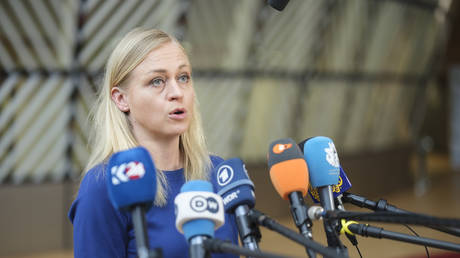 New NATO member backs Macron on troops in Ukraine
New NATO member backs Macron on troops in Ukraine
The remarks, which Macron later described as having been “weighed, thought through, and measured,” prompted a wave of denials from a vast majority of NATO states and the bloc’s leadership. NATO Secretary-General Jens Stoltenberg publicly refuted the idea shortly after Macron’s initial statement, saying that no plans existed to deploy troops to Ukraine. Numerous Western leaders, including US President Joe Biden and German Chancellor Olaf Scholz, have also denied any such plans.
Russian President Vladimir Putin has said any NATO troop deployments in Ukraine would not change the situation on the battlefield, given that Western soldiers are already active in the country as military advisers and mercenaries. He nonetheless warned that the ramifications of such a move would be “tragic.”
-
Site: RT - News
Afghanistan is expected to participate in the annual event, devoted to economic cooperation between Moscow and the Islamic world
The Taliban has been invited to participate in an upcoming economic forum in Russia, according to Moscow’s special presidential envoy on Afghanistan. Zamir Kabulov confirmed to TASS on Monday that Taliban representatives plan to take part in the event.
The 15th international ‘Russia-Islamic World: KazanForum’ will be held on May 14-19 in Kazan, the capital of Russia’s Republic of Tatarstan. It is the main platform for economic cooperation between Moscow and the countries of the Islamic world, according to the forum’s website.
Kabulov did not provide any further details, but said that cooperation between Russia and the Taliban government in Afghanistan on countering international terrorism “is carried out on a regular basis.”
It is not the first time that the Taliban has been invited to the Kazan forum. Kabulov, however, who also serves as the director of the second Asian Department at the Russian Foreign Ministry, clarified last year that the Taliban’s participation “absolutely does not mean” its recognition by Moscow.
Russia’s Foreign Ministry told TASS on Monday that the issue of withdrawing the ‘terrorist organization’ designation from the Taliban is currently being worked out, with the final decision to be made by the country’s top leadership.
Although Russia has not formally recognized the Taliban, which took power in Kabul in 2021 during the final stage of the withdrawal of US troops, Moscow was among the first to establish contacts and agree business deals with the new government. Not a single country officially recognizes the Taliban government.
READ MORE: World must work with Taliban – Moscow
The Taliban first came to power in Afghanistan in the 1990s but was ousted in 2001 during the US-led invasion. The Taliban insurgency continued for 20 years, culminating in a march on Kabul in August 2021, during which internationally recognized President Ashraf Ghani was forced to flee the country.
After assuming power once again, the Taliban promised not to allow any discrimination against women. The group, however, soon adopted a set of regulations restricting female participation in public life. The move has drawn criticism from the UN and international human rights organizations.
-
Site: RT - News
The Russian military is ready for the possible deployment of the US-led bloc’s troops to Ukraine, a top diplomat has said
The current state of relations between Russia and NATO can be described as “something more than a Cold War,” the head of Moscow’s delegation at the Vienna talks on military security and arms control, Konstantin Gavrilov, has said.
During an interview with RIA Novosti on Monday, Gavrilov was asked to comment on French President Emmanuel Macron’s February statement that he “cannot exclude” the possibility of troops from NATO countries being sent to Ukraine to aid Kiev in the conflict with Moscow.
“The military strategists in Washington and Brussels should realize: if by lifting the taboo on the potential deployment of the bloc’s servicemen to Ukraine they are trying to test our country’s strength, then we are ready for any turn of events,” he replied.
According to the diplomat, warnings by US President Joe Biden and other Western politicians, that if Russia defeats Ukraine it is going to take on NATO states next, are actually aimed at diverting “the attention of taxpayers from the senseless pumping of their money into the Ukrainian ‘corruption black hole’ as well as to warm up the public opinion in favor of reviving defense industries in their countries.”
Read more New NATO member backs Macron on troops in Ukraine
New NATO member backs Macron on troops in Ukraine
His comment echoed Russian President Vladimir Putin’s statement last week that “the claims that we are going to attack Europe after Ukraine – it is utter nonsense and intimidation of their own population just to beat the money out of them.”
Gavrilov said that during the Cold War, almost all NATO statements began with the evaluation of the possibility of a sudden large-scale attack on the bloc by the USSR and its Eastern European allies. Similar rhetoric is prevalent within the US-led military alliance today, he added.
The diplomat recalled that Russia has been labeled “the most significant and direct threat” in NATO’s Strategic Concept, which was adopted in 2022. “Apparently, now their ideal vision of European security is the borders with our country being wrapped in barbed wire,” he said.
“As a result, Russia-NATO relations can now be characterized as something more than a Cold War,” Gavrilov stressed.
READ MORE: No ‘direct threat’ from Russia – senior NATO officer
Since fighting between Russia and Ukraine began in February 2022, Moscow has said repeatedly that the US and its NATO allies have become de-facto parties to the conflict through the provision of arms, including advanced weaponry, intelligence-sharing, and the training of Ukrainian troops.
-
Site: RT - News
The former PayPal chief says US politicians such as Nancy Pelosi should be held accountable for encouraging the doomed operation
The failure of Ukraine’s 2023 summer counteroffensive against Russia was “easily predictable,” according to US tech entrepreneur and venture capitalist David Sacks, who has suggested that the Washington elite should be held accountable for talking up the doomed operation.
Sacks’ comments came in response to a post on Saturday by Tesla and SpaceX CEO Elon Musk, who condemned the unnecessary loss of life suffered by Kiev’s forces as they attempted to “attack a larger army” that had superior defenses.
The failed Ukrainian counteroffensive was “one of the biggest debacles in the history of modern warfare,” Sacks said in agreement, adding that Kiev’s soldiers and tanks had effectively run “headlong into minefields while Russian artillery rained down on them from heavily fortified positions.”
“This should have been easily predictable,” the former PayPal COO and founder of the Yammer corporate social network stressed.
According to estimates released in March by the Russian Defense Ministry, the Ukrainian military saw over 166,000 casualties during last year’s failed counteroffensive. Kiev’s overall casualties since the outbreak of the conflict with Russia stand at 444,000, the ministry has claimed.
Sacks went on to suggest that US officials such as ex-CIA chief David Petraeus, former House Speaker Nancy Pelosi, and current US Secretary of State Antony Blinken should all be held responsible for encouraging the doomed operation.
Read more ‘Odessa will fall’, Musk warns Ukraine
‘Odessa will fall’, Musk warns Ukraine
“These people are fools who should have no credibility left. But of course the MSM never holds them accountable so we will get more of the same until Ukraine finally collapses,” Sacks surmised.
Musk, meanwhile, has called the counteroffensive “a tragic waste of life for Ukraine,” suggesting that Kiev should not have attacked Russian forces – which had deployed vast minefields and had stronger artillery – while Ukrainian forces lacked armor or air superiority.
“Any fool could have predicted that,” the billionaire said, recalling that one year ago he had recommended that Kiev’s forces entrench and apply all resources to defense.
Musk stated that Kiev would continue to have difficulty holding on to territory, but suggested that Russia was unlikely try to take over the entire country, arguing that it would face “extreme” local resistance in western regions of Ukraine.
He also warned that if the conflict “lasts long enough, Odessa will fall,” and advised Kiev to reach a negotiated settlement with Moscow as soon as possible, before Russia gains more territory and Ukraine loses all access to the Black Sea.
Moscow has stressed that it remains open to meaningful talks with Kiev, and has blamed the lack of a diplomatic breakthrough on the Ukrainian authorities, who refuse to accept the “reality on the ground.”

